06 de fevereiro de 2026
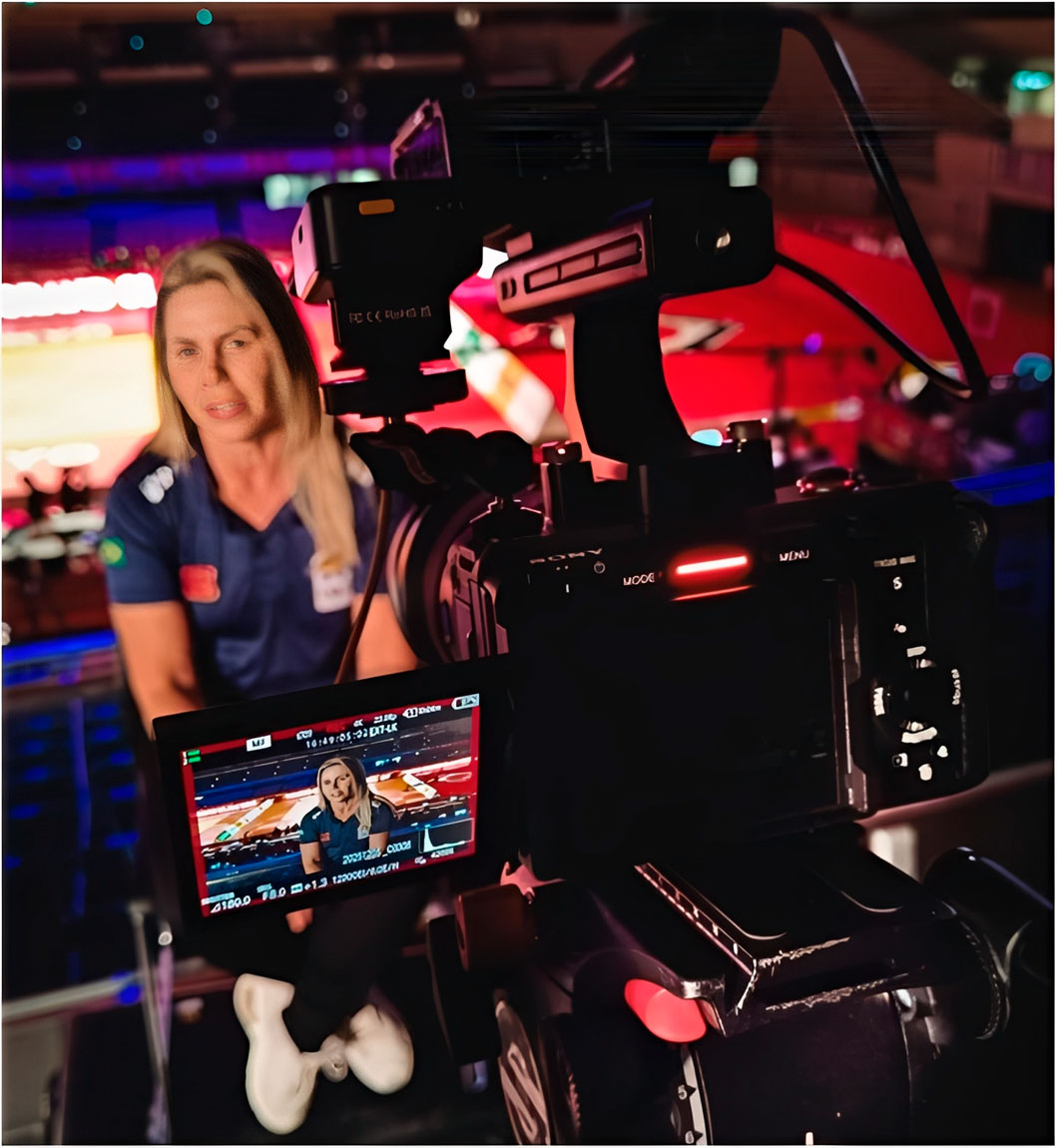
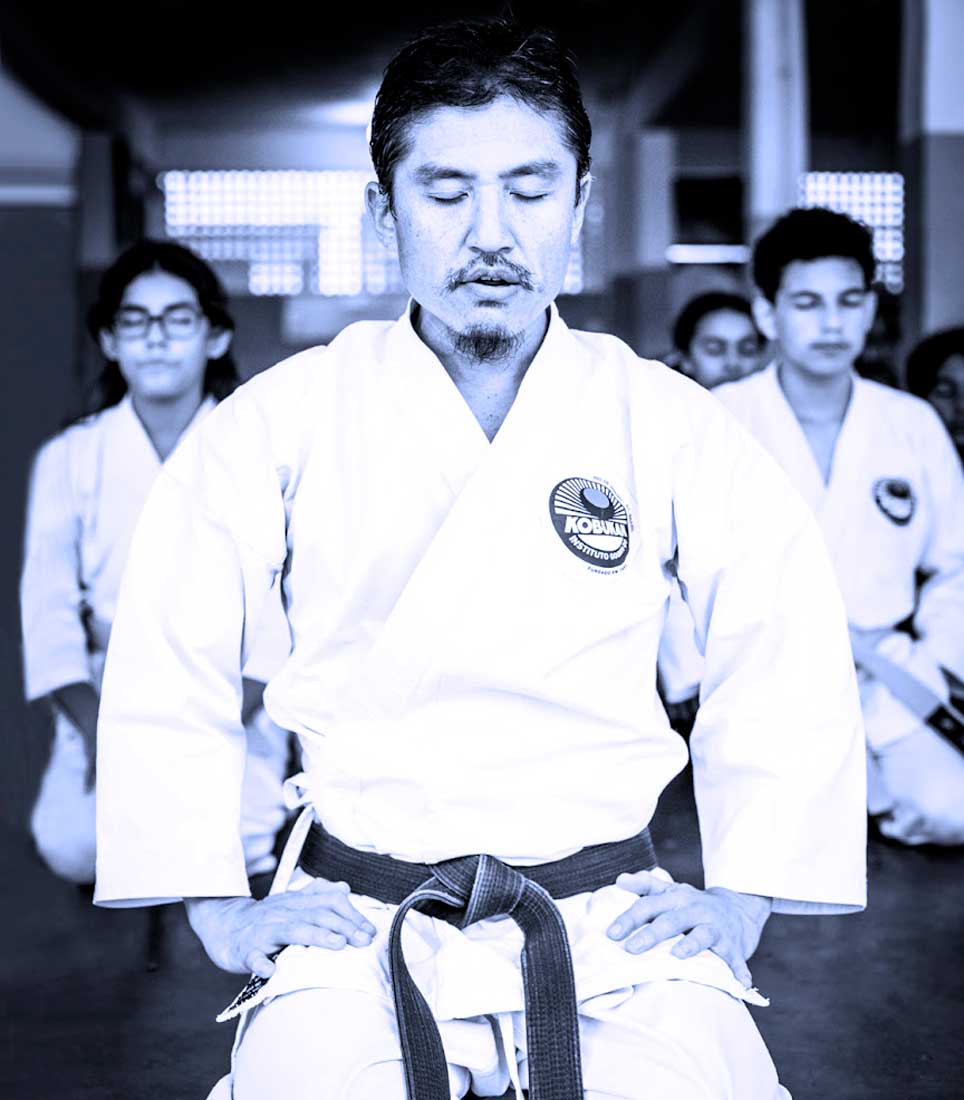 In seiza, sensei Guaraci Tanaka in mokuso before the class begins © ftdiniz / Felipe Diniz
In seiza, sensei Guaraci Tanaka in mokuso before the class begins © ftdiniz / Felipe Diniz
Socio-educational karate is based on the traditional karate philosophy of Master Hidetaka Nishiyama, which focuses on self-development. These projects originated in the city of Guarapuava, Paraná, in 1992, initiated by Professor Guilherme Antônio Carollo, a 6th dan black belt from ITKF, founder, and coordinator of the Educational Association for Human and Social Development (ADDES). Inspired by this model, he suggested to Professor Gilberto Gaertner, Chairman of the International Traditional Karate Federation (ITKF), that the organization create a certification to recognize the educational quality and social importance of these initiatives.
The certification boosts the credibility of associations with public and private organizations, enhancing the sustainability of these projects. “I believe that if we promote this process more, global participation will increase,” says sensei Guilherme.
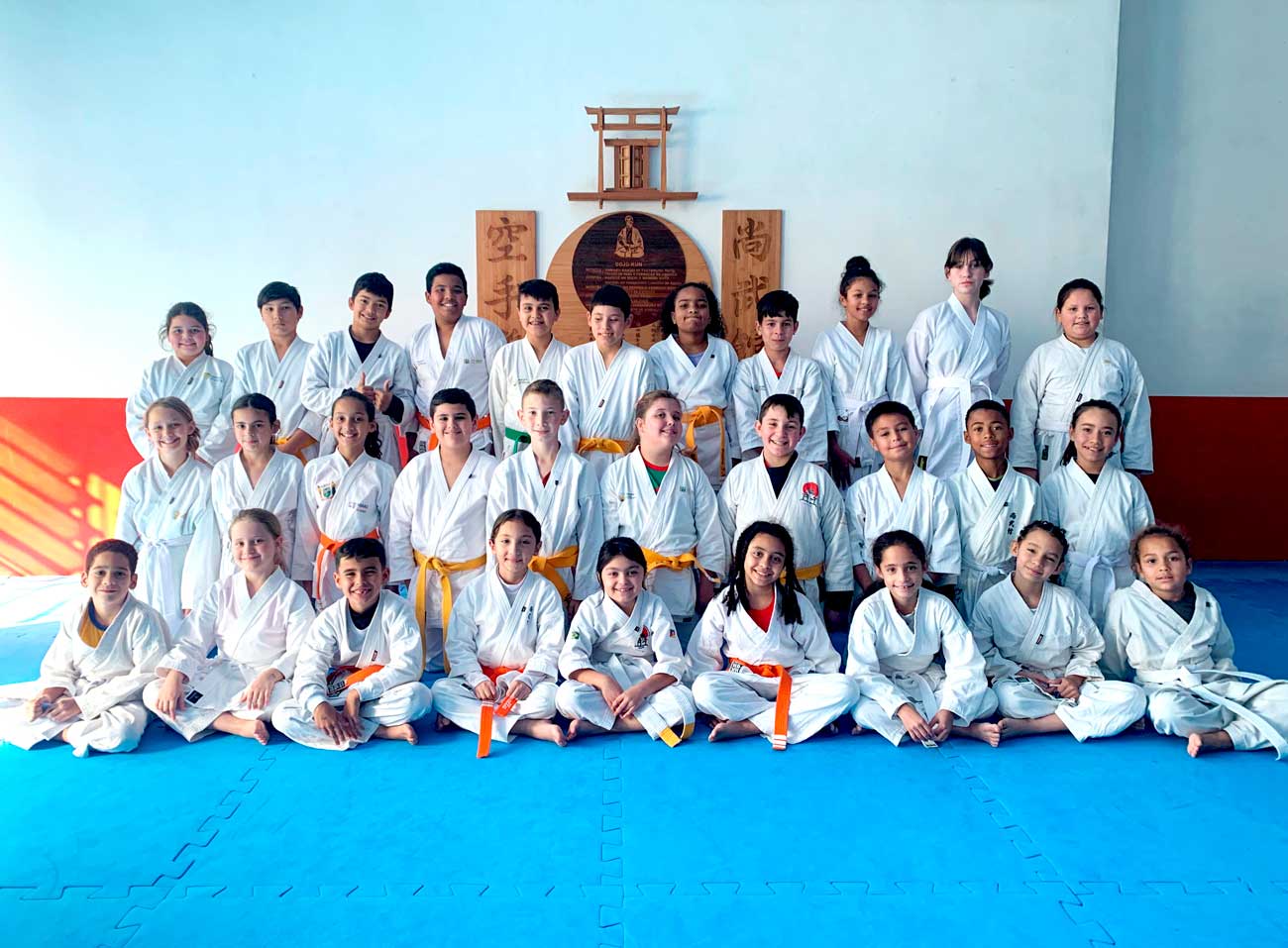
Some students from the Adopt a Champion project at the Marau Child and Adolescent Reference Center, whose faculty includes professors Juarez da Silva, Eduardo Debovi, Frank Manera, and Samanta Martello © Archive
ITKF Socio-Educational Karate – SMELJ/ADDES – Curitiba, PR
(Reference project for certification)
Responsible Professor: Daniel Pizzano Carollo
VemSer Rio de Janeiro! – Rio de Janeiro, RJ
Responsible Professor: Guaraci Ken Tanaka
Adopt a Champion – Center for Child and Adolescent Reference – Marau, RS
Responsible Professor: Juarez da Silva
Musashi Karate Club Socio-Educational Project – Salvador, BA
Responsible Professor: Jonathan Miranda Júnior
UEM/HAGAKURE Traditional Karate Project – Maringá, PR
Responsible Professor: Marcelo Alessandro Pereira
Castro Karate Project – Castro, PR
Responsible Professor: Robson da Luz Barbosa
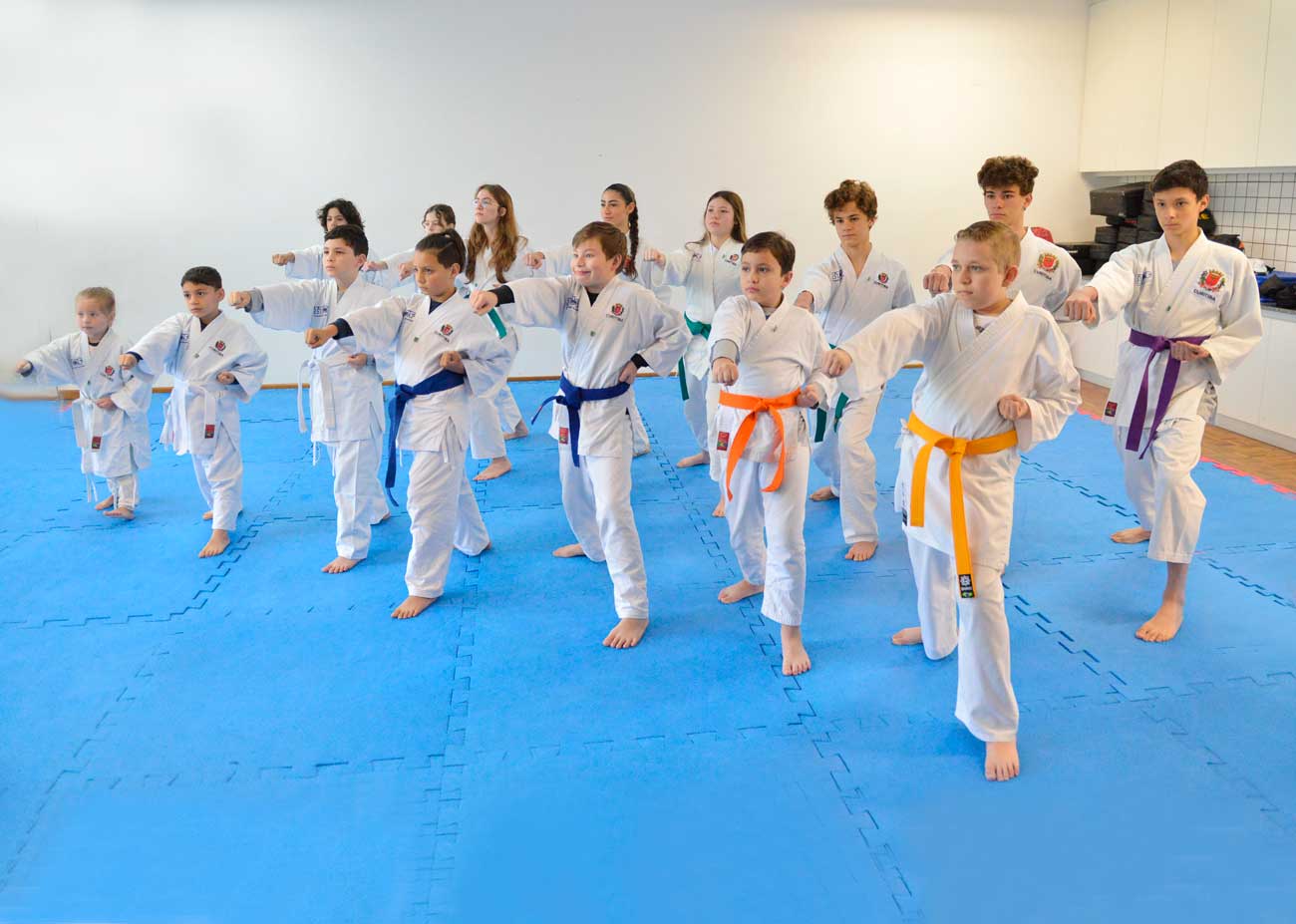
Part of the students from the ITKF Socio-Educational Karate – SMELJ/ADDES project in Curitiba (PR) © Global Sports
“Social projects with karate have shown the ability to reach audiences that other initiatives do not,” says Professor Guilherme Carollo. “Additionally, they manage to keep participants motivated, who, for the most part, always want to continue practicing.”
Another aspect highlighted by sensei is the impact of the projects, not only during participation but even years later when practitioners move on to other paths in life. This success is attributed to two key factors: adherence to karate principles and non-competitive practice.
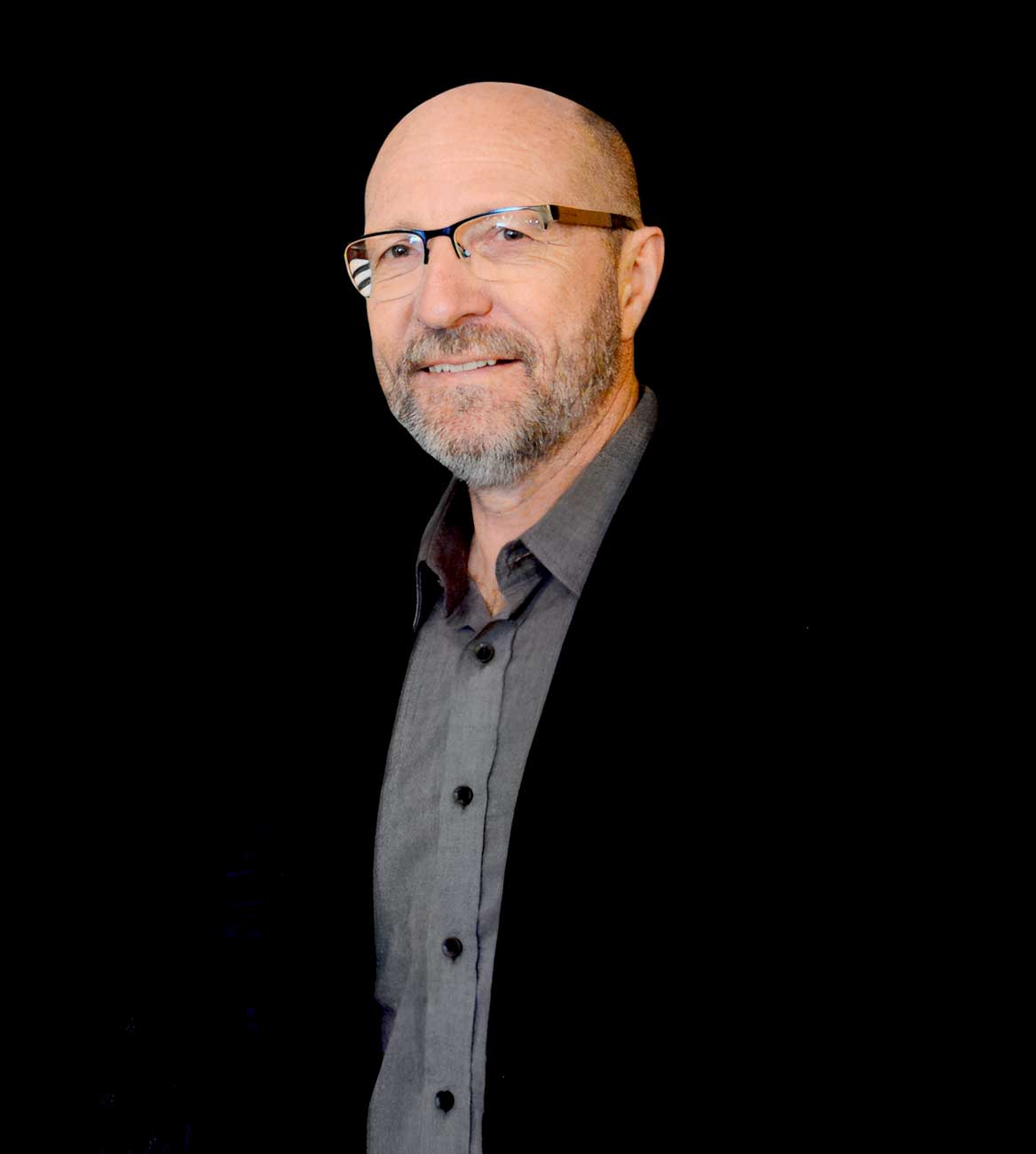
Gilberto Gaertner, Chairman of ITKF © Global Sports
Karate’s mottos provide personal development in a simple manner. These are clear guidelines, experienced in the dojo, and replicable in the daily lives of practitioners. Based on a philosophy of comprehensive human development, they incorporate five Buddhist influences: pacification of the senses, acceptance of the inevitable with tranquility, self-mastery in any circumstance, greater intimacy with the idea of life than with death, and pure humility.
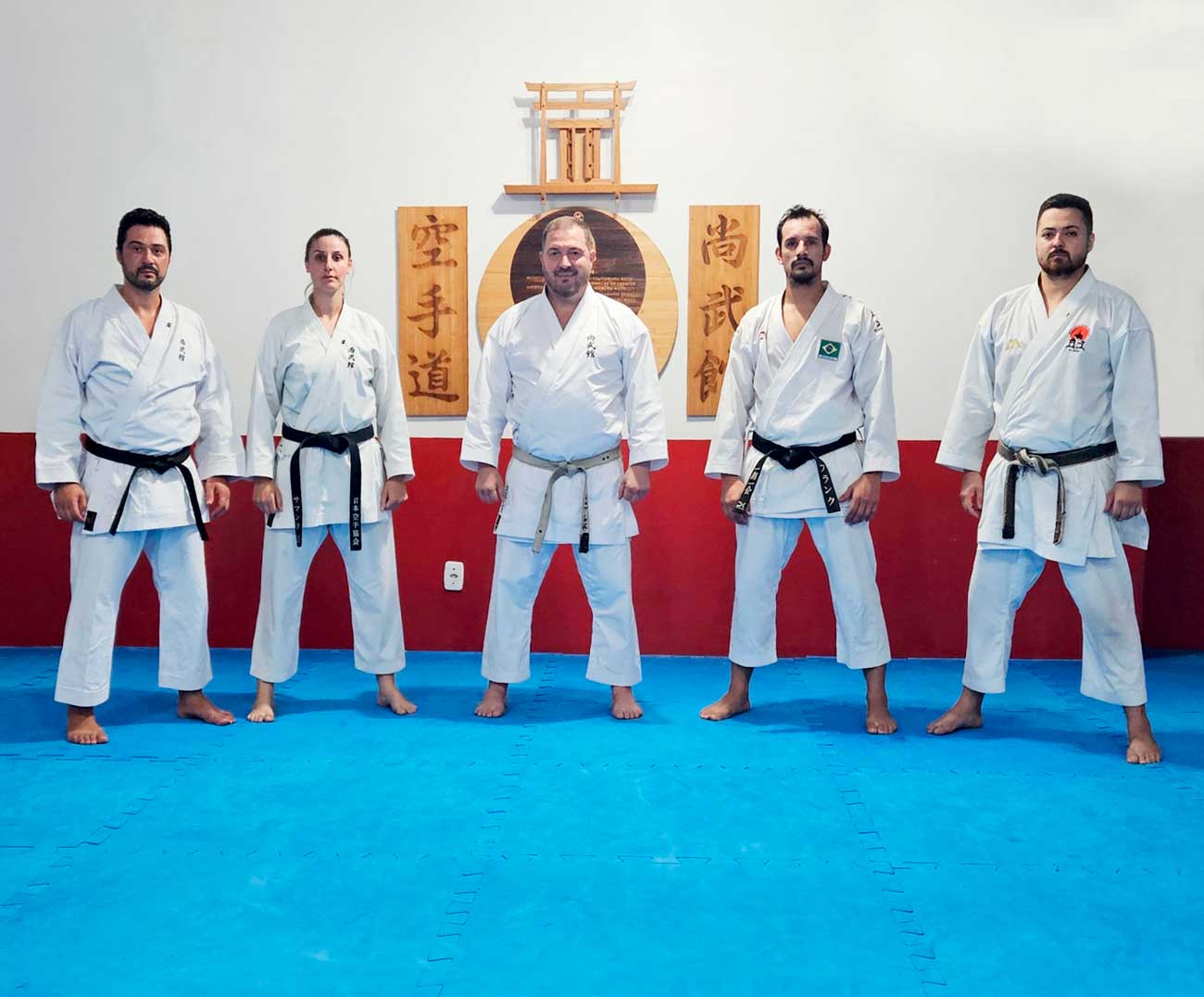
Professors from ITKF’s social projects in Rio Grande do Sul, Eduardo Debovi, Samanta Martello, Juarez da Silva, Frank Manera, and Douglas Albano © Archive
These and other teachings, sensei Guilherme states, permeate each activity of the projects, enhancing the formation of positive life values. “The way classes are conducted leads to such construction,” he says. “This philosophy translates into the rituals practiced from the beginning of classes, such as bowing to enter and leave the training area, greeting the instructor and training partners, brief meditation at the beginning and end of practice, barefoot and white uniform, as well as repeating karate’s mottos. All this serves as a reference for the practitioner in terms of both discipline and hierarchy and courtesy.”
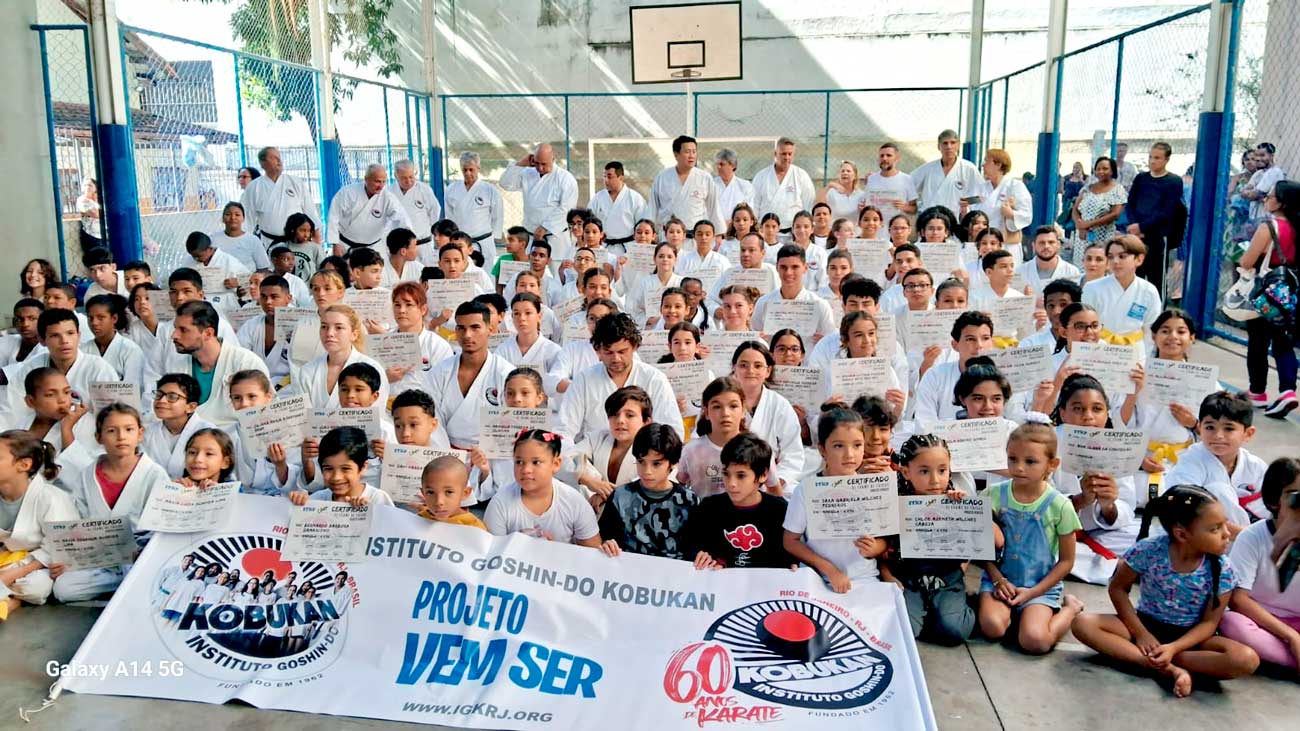
Students and invited professors for the VI Festival of Schools and Belt Examination at the Municipal School Nilo Peçanha © ftdiniz / Felipe Diniz
The absence of competition relieves pressure on participants, unlike other sports and cultural practices. “In traditional karate,” explains sensei Guilherme, “all efforts are made to overcome oneself, to improve each day. Even the moments of confrontation, whether in training or festivals, are understood as a collaborative process where each karateka allows the other’s efforts to be evaluated and tested. The focus is not on accumulating medals and trophies or showing off in front of others.”
In summary, the main goals of socio-educational karate are the comprehensive development of practitioners, building positive life projects, and personal and social protagonism.
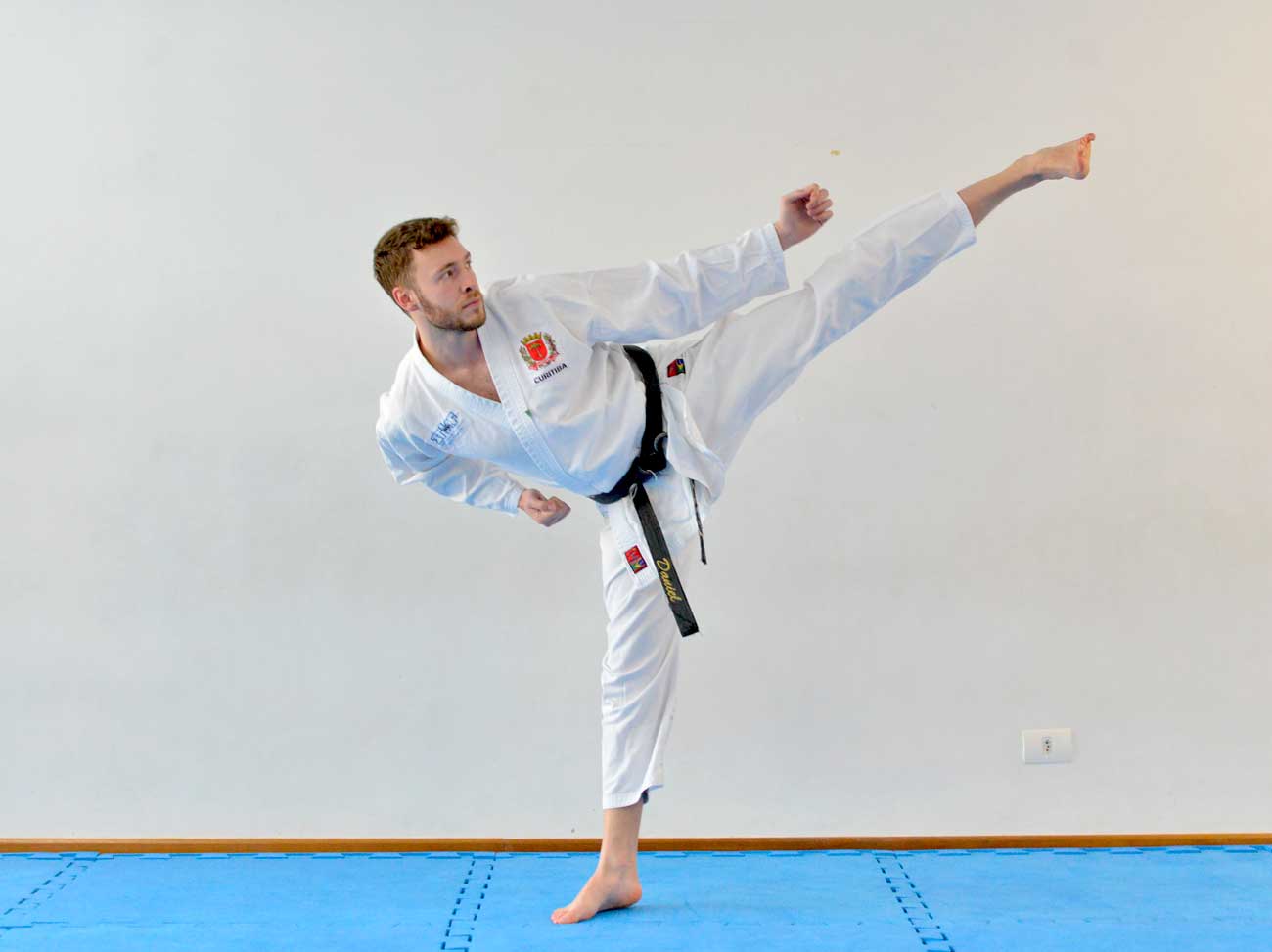
Sensei Daniel Pizzano Carollo performs Kanku Dai, an advanced kata in Shotokan karate with origins tracing back to the Kushanku kata, brought from Okinawa © Global Sports
The Goshin-Dô Kobukan Institute is not just a karate teaching space but a guardian of the history and values that shaped this art in Rio de Janeiro. Its legacy began in 2018 when the VemSer Project was initiated as an extension project of IPUB/UFRJ, in partnership with Professor and Psychologist Leila Ribeiro from SPIA/IPUB. Originally serving a public school, the project quickly expanded to two more.
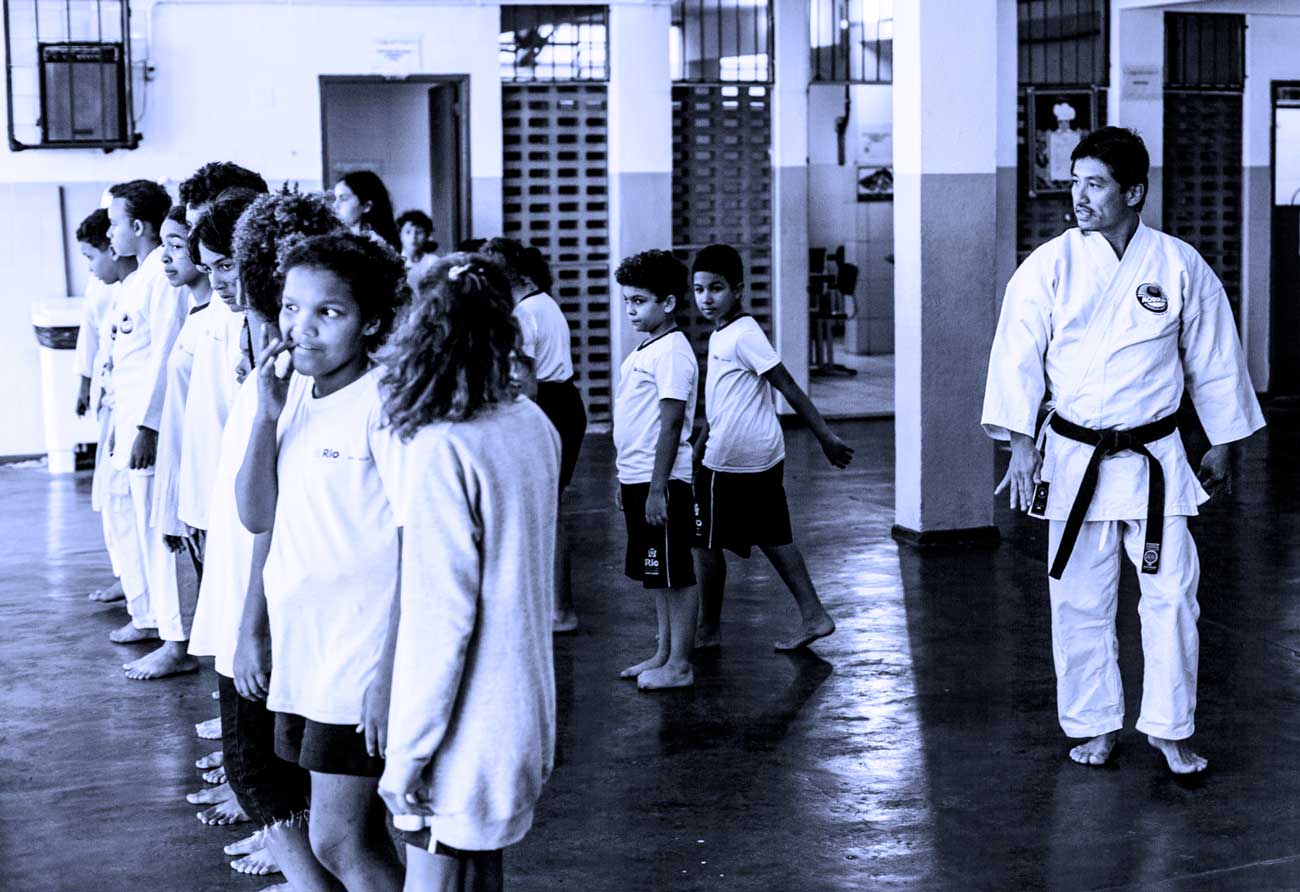
Sensei Tanaka instructs his students for initial formation. According to him, discipline begins with the initial alignment – Class at E.M. João Saldanha © ftdiniz / Felipe Diniz
In mid-2018, with the loss of Shihan Yasutaka Tanaka (10th dan), the highest leader of ITKF in Brazil, the creation of the Goshin-Dô Kobukan Institute became a priority. Inspired by the Goshin Institute of Master Tasuke Watanabe, IGKRJ was officially founded in 2021, after the challenges imposed by the pandemic. This period allowed a deep recovery of the history of national karate, bringing together old practitioners such as Commander Bruno, one of the first students of the Kobukan academy, sensei Eduardo Santos as Technical Director, sensei Paulo Uchoa (Urso) as Administrative Director, and sensei Paulo Jordão as a teacher.
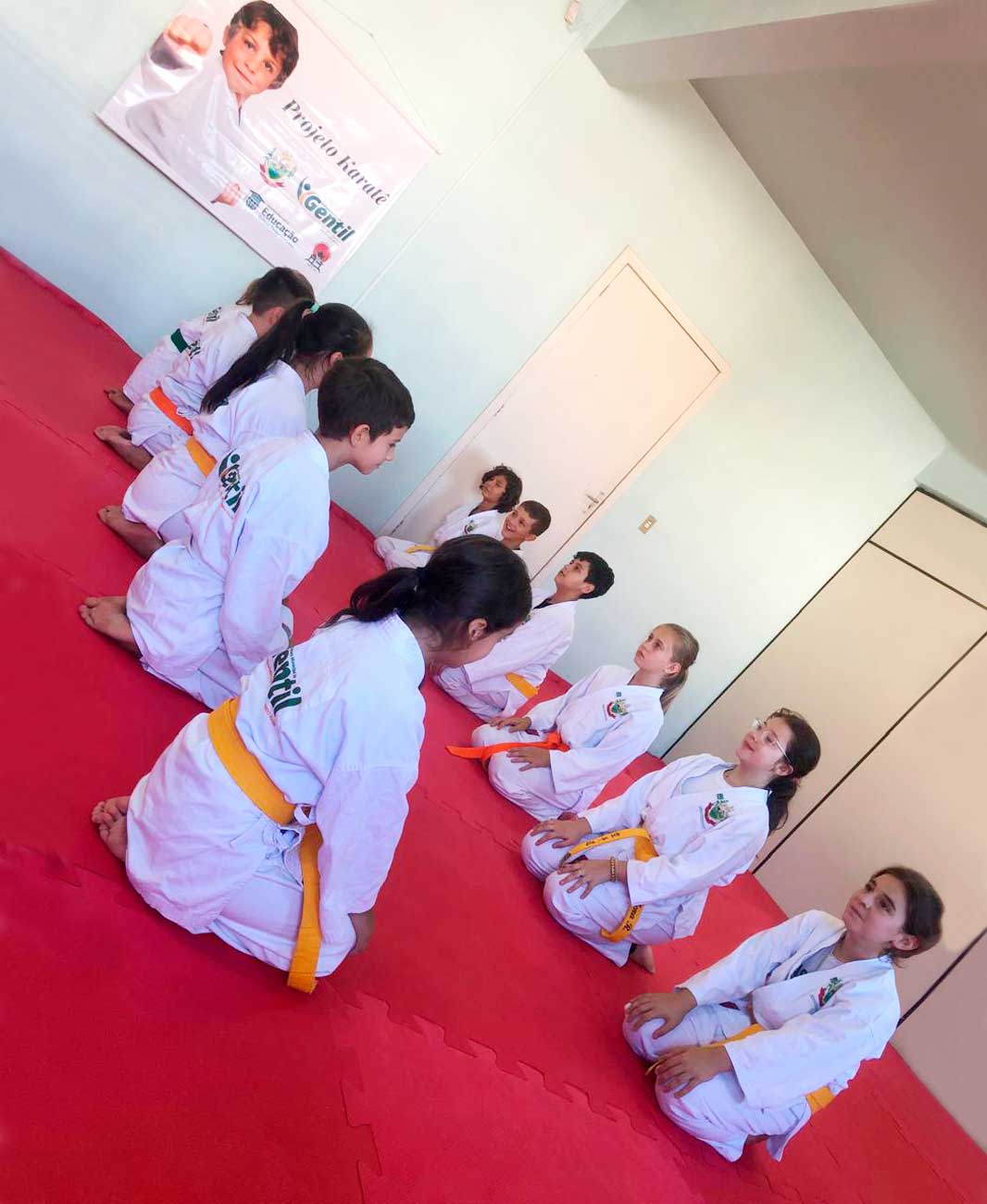
Students of Sensei Douglas Albano from the Adopt a Champion project in Gentil © Archive
Under the leadership of Guaraci Ken Tanaka, the son of the master, the VemSer Project now serves over 500 children in 15 municipal school centers, keeping the essence of traditional karate alive. More than teaching self-defense techniques, the Institute emphasizes fundamental principles such as respect (order) and commitment (progress), essential for developing responsible and socially engaged citizens.
The low annual dropout rate highlights the effectiveness of the VemSer Project in keeping young people engaged and committed. This ongoing commitment reflects the spirit of constant effort and resilience promoted by karate, as sensei Guaraci emphasizes: “In an era dominated by information speed and the desire for immediate gratification, karate offers an anchor of essential values like honesty and self-control,” he emphasizes.
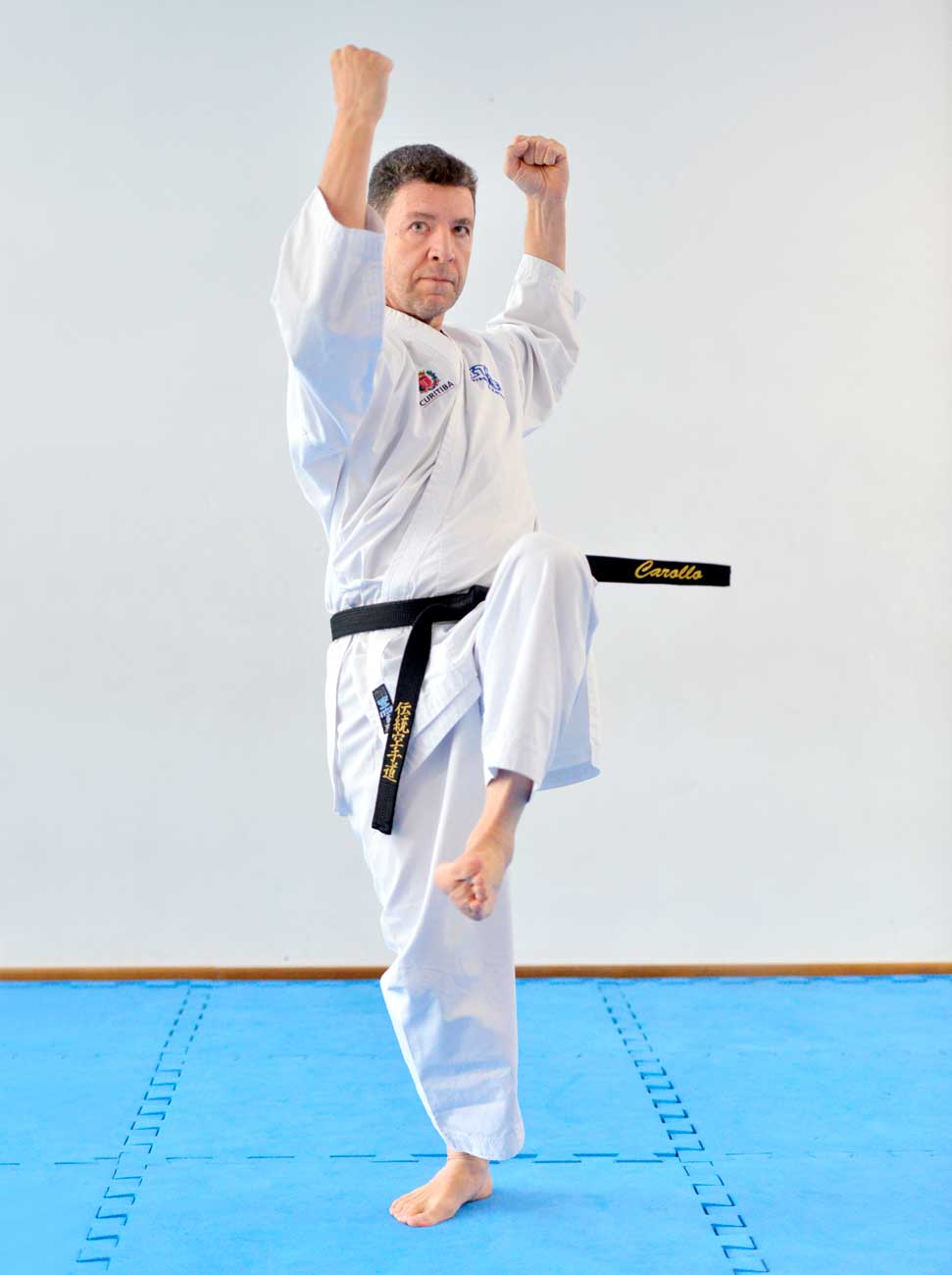
Sensei Carollo performs Jitte. The Jitte kata is an advanced kata in Shotokan known for its emphasis on defensive and control techniques against multiple opponents. The name “Jitte” translates to “ten hands,” suggesting that the practitioner should develop skills equivalent to having ten hands available, symbolizing the ability to face multiple adversaries effectively and powerfully © Global Sports
The Goshin-Dô Kobukan Institute is thus a landmark in the history of karate in Rio de Janeiro. It not only preserves but also revitalizes a legacy of over 60 years, passing on the importance of all those who contributed to this rich history. In this way, project students feel connected to the past, experiencing the tradition and teachings of the great masters, even without having met them personally.
The Goshin-Dô Kobukan Institute is not just a karate teaching center but a force for social transformation. It educates and inspires, strengthening the values crucial for building a better future for our children and young people, ensuring that karate’s legacy remains alive and relevant for future generations.
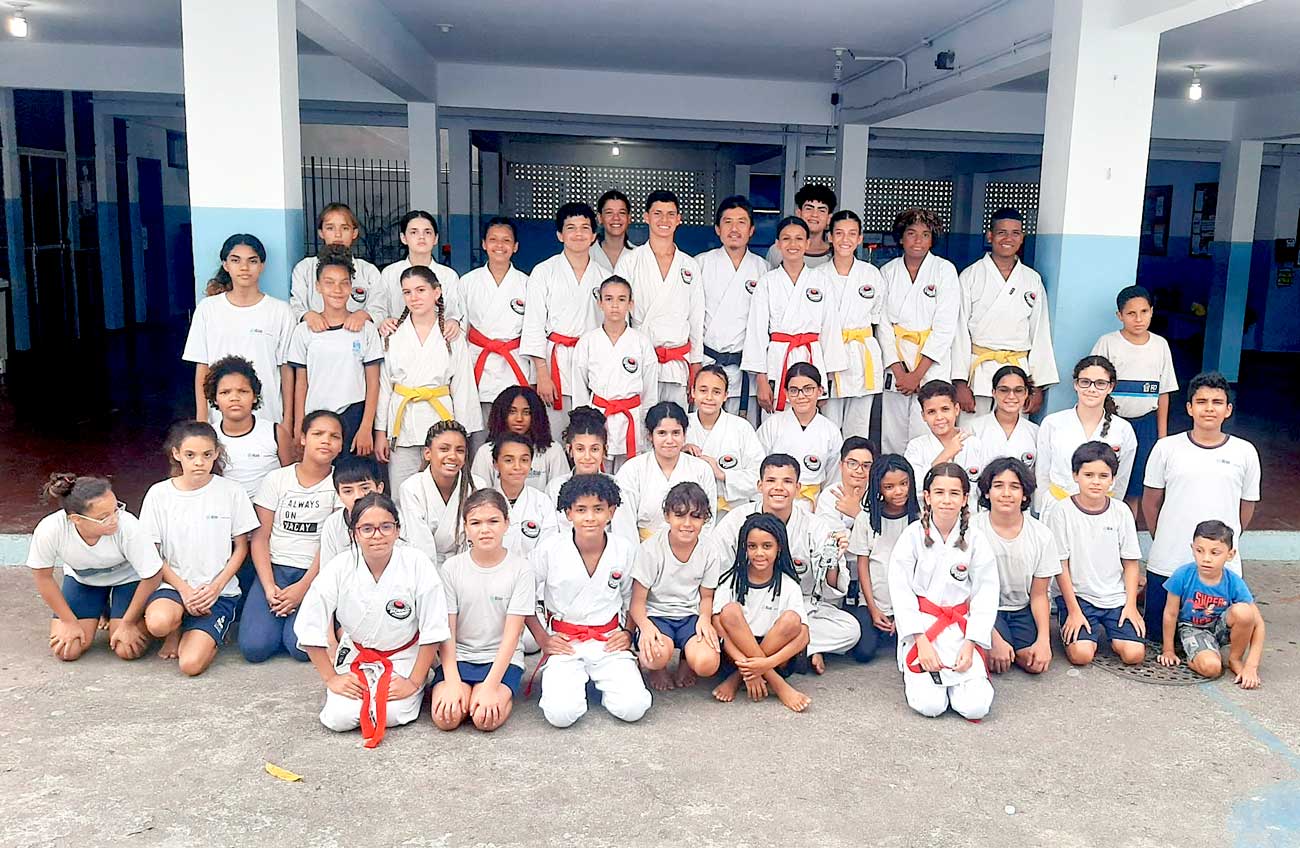
Part of the students from the Municipal School João Saldanha © ftdiniz / Felipe Diniz
Sensei Guaraci is a 3rd dan black belt and a Ph.D. in mental health, with a thesis showing how karate can be an effective tool for neurocognitive development in children at different stages of biological maturation. Supported by scientific studies, the project’s focus is to instill the teachings of Dojo Kun in children’s lives, showing that victories are the result of hard work and that defeats are opportunities for growth and overcoming.
Following Engel’s biopsychosocial model, IGKRJ stands out by developing intrinsic and relational skills. Besides the sporting aspect, it is concerned with health, education, and culture, complemented by scientific research on karate practice, mindfulness, and neuroscience.
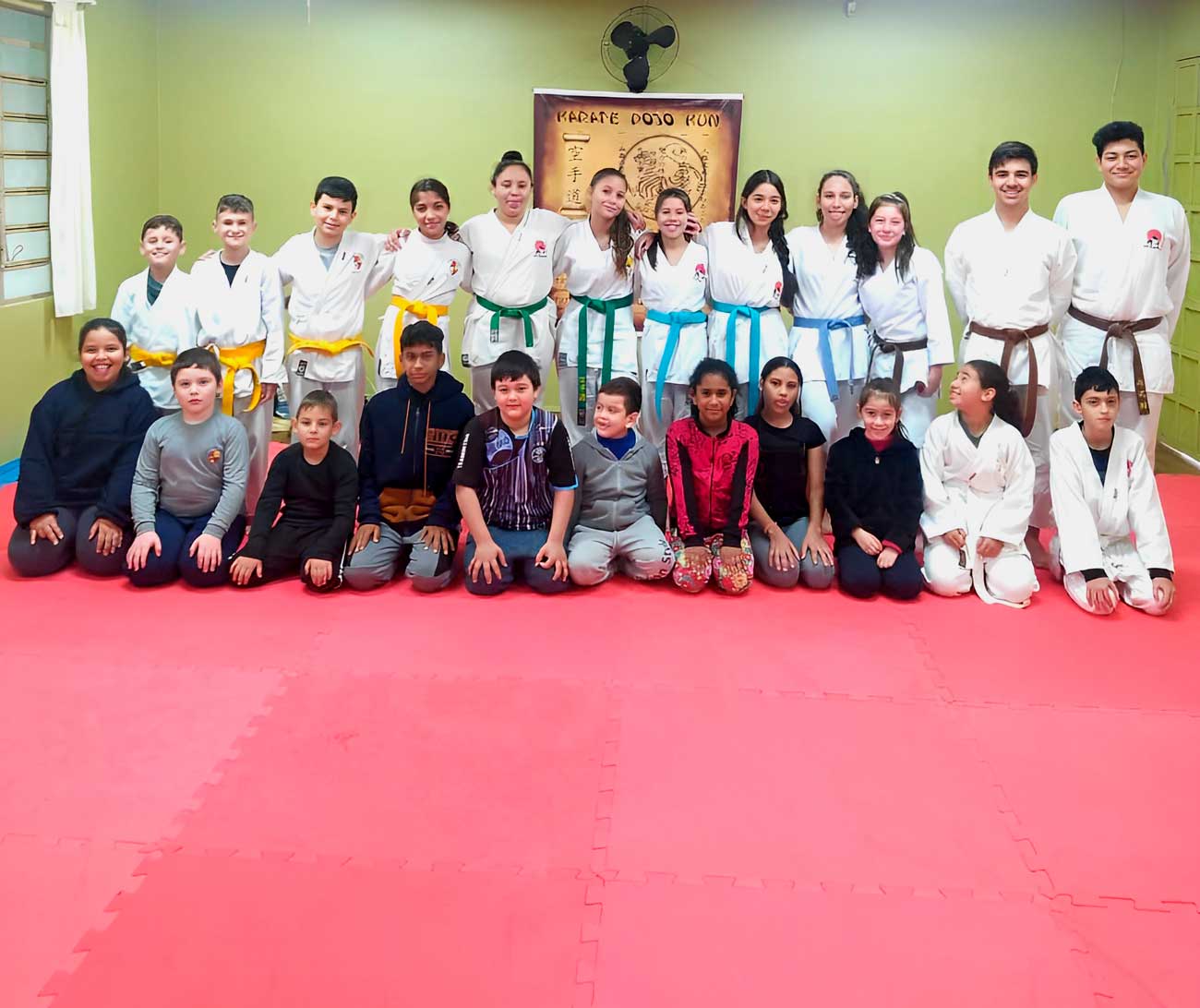
Part of the students from the Adopt a Champion project at the Marau Child and Adolescent Reference Center © Archive
IGKRJ was the second institution to receive ITKF certification, which brought the organization closer to its common goals and opened important doors. “This recognition is a testament to the dedication and excellence that IGKRJ promotes, aligned with the values of Dojo Kun,” emphasizes sensei Guaraci.
So much so that the VemSer Project is recognized by the Ministry of Sports and is in the process of state and municipal certification. Partnership with the public sector is seen as essential, but the institution also relies on spontaneous donations from the private sector, through entrepreneurs and martial arts enthusiasts.
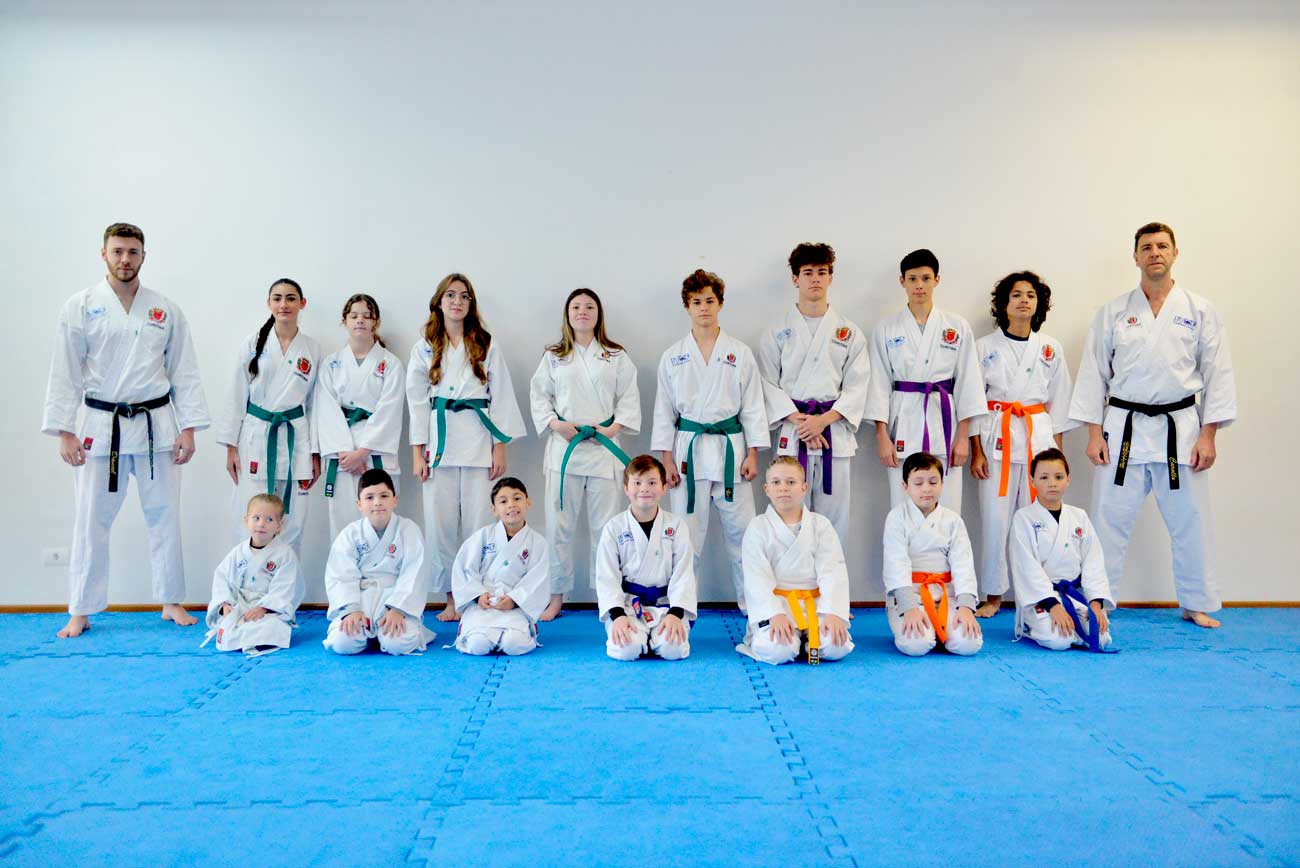
Professors Daniel Pizzano Carollo and Guilherme Carollo with some students from the project based at the Santa Felicidade Community Center © Global Sports
Although the main focus of VemSer is karate in schools, IGKRJ receives help from volunteers who offer valuable additional services, such as language classes and lectures by successful entrepreneurs, project partners. “This curricular enrichment promotes holistic education, aligned with karate’s philosophy of developing mind and body.”
Currently, project students represent a significant portion of athletes in competitions – a crucial link for institutional growth, according to sensei Guaraci. “This competitive success reflects the discipline and perseverance instilled by ITKF’s traditional karate training.”
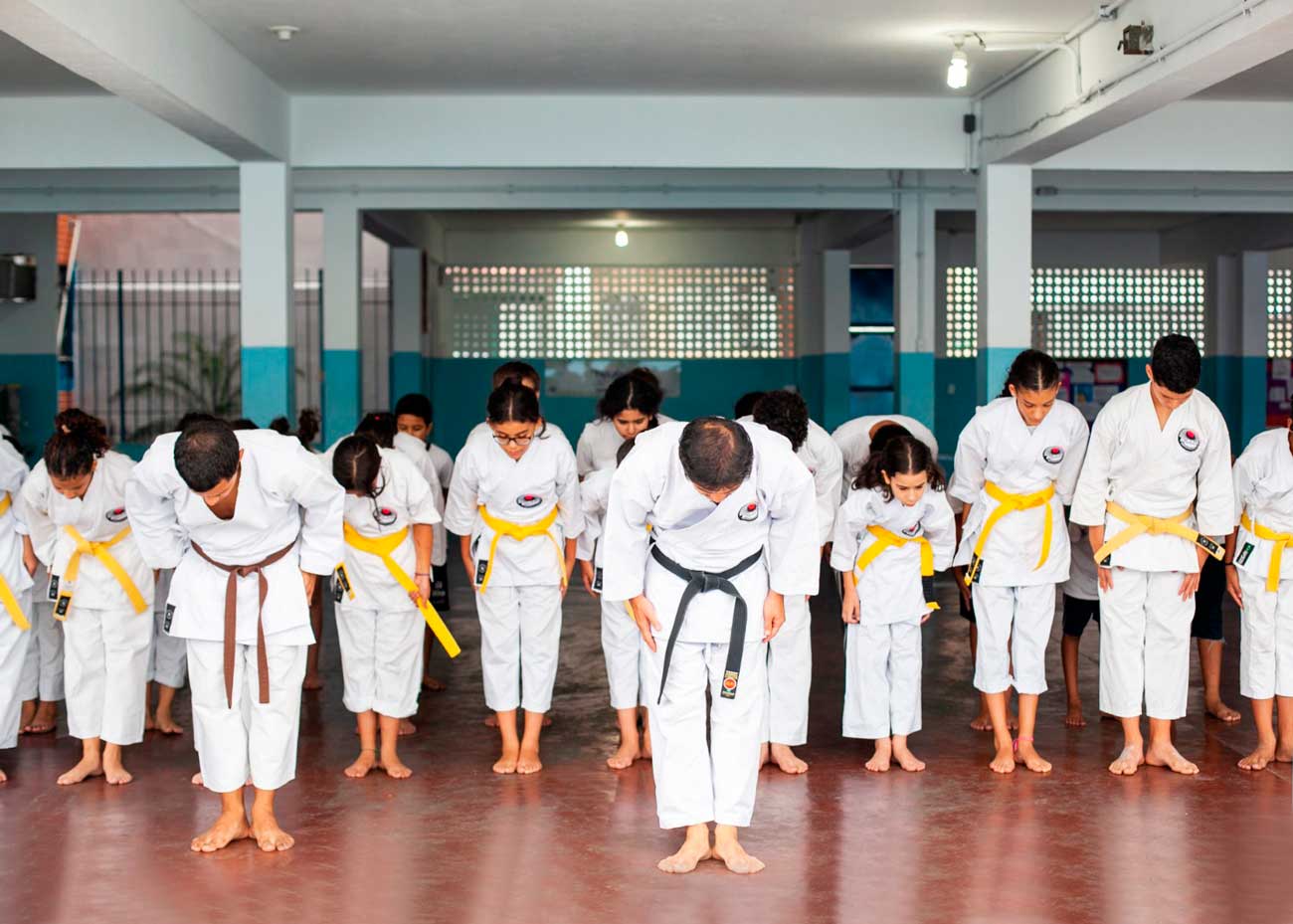
Sensei Tanaka commands the shomen-ni-rei at the Municipal School João Saldanha © ftdiniz / Felipe Diniz
“Certification is ITKF’s recognition of excellence projects, highlighting karate’s social impact and showing how this practice contributes to individual development. Moreover, it helps institutionalize and validate socio-educational work, expanding its reach and impact,” assures Daniel Pizzano Carollo.
Responsible for the project started in 2021, serving about 35 children and teenagers at the Santa Felicidade Community Center, a facility of Curitiba City Hall, sensei Daniel is a 2nd dan black belt and was the world champion of traditional karate in the under-21 category in 2019. In three years, about 150 young people have been served.
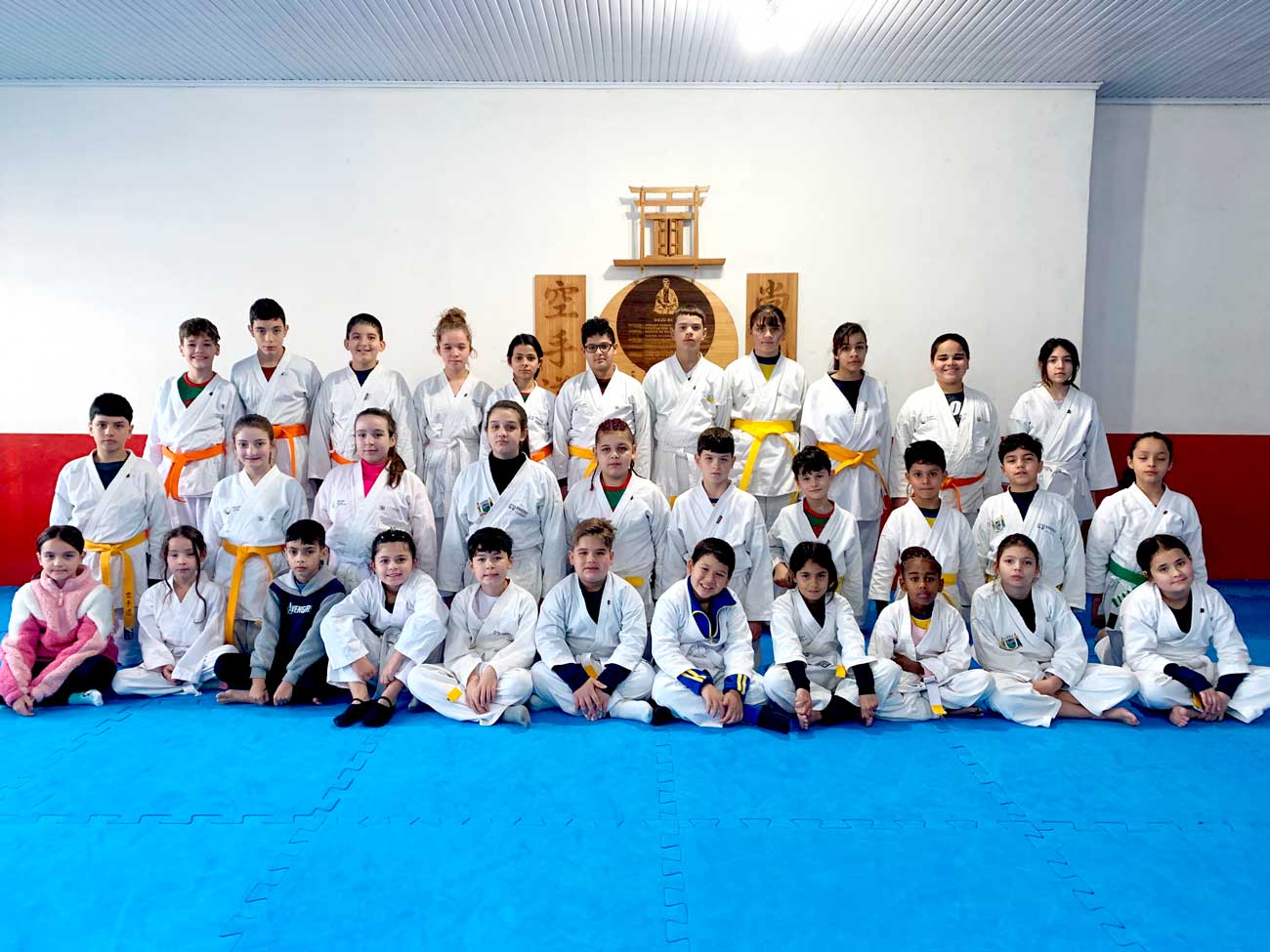
Part of the students from the Adopt a Champion project at the Marau Child and Adolescent Reference Center © Archive
“Social projects involving sports, like our traditional karate, offer a new life perspective for children and young people,” explains sensei Daniel. “They provide not only a more positive view of themselves but also of the world around them, which is one reason martial arts should be understood as essential in individual development.”
He emphasizes that in karate, practitioners develop discipline, respect, and self-esteem, essential qualities to face challenges and build a better future and society. “As Gichin Funakoshi said, the ultimate goal of karate does not lie in victory or defeat, but in the perfection of the character of its practitioners.”
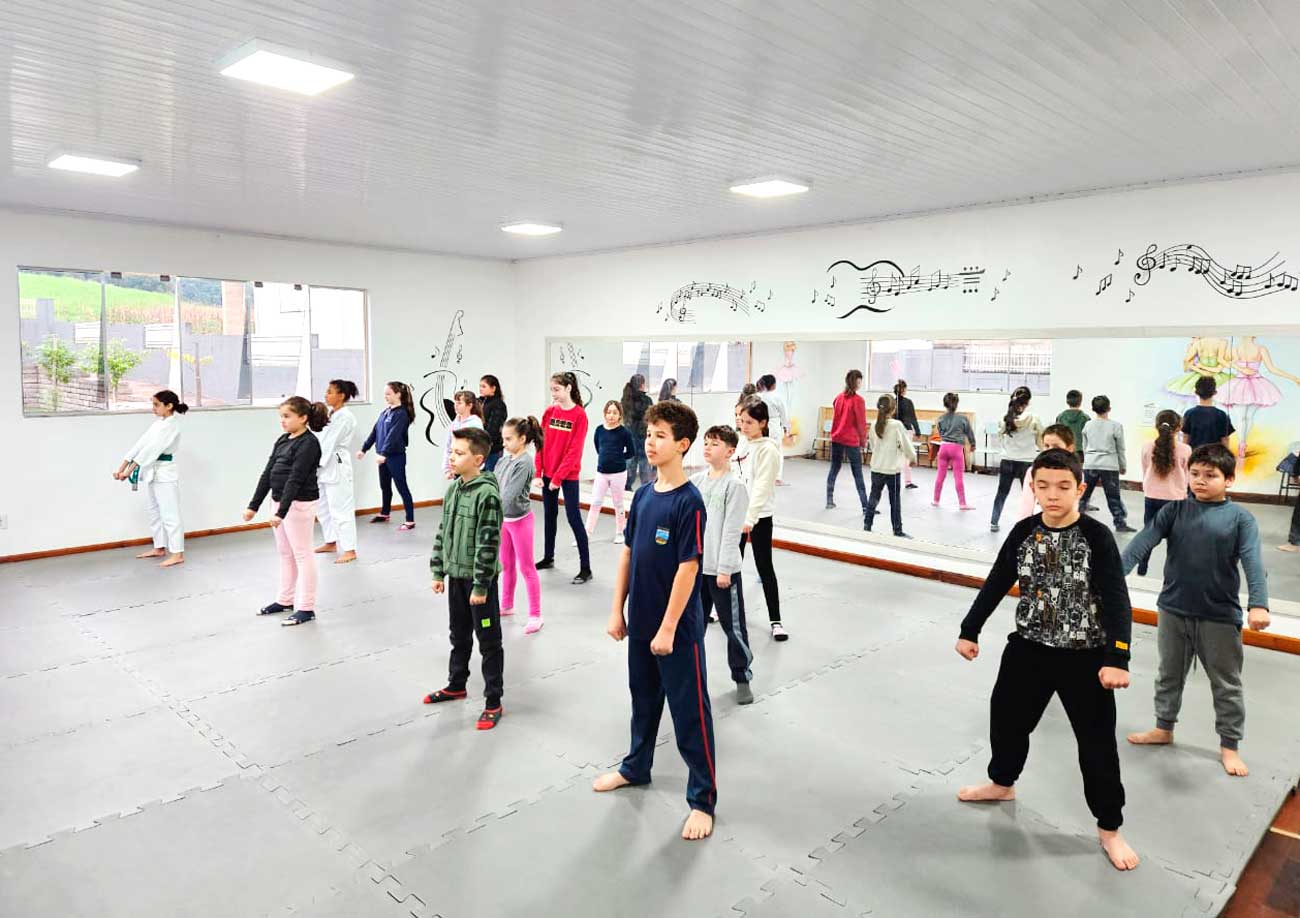
Students of sensei Eduardo Debovi from the Adopt a Champion project in Nova Alvorada © Archive
When children start practicing karate and acquiring self-defense knowledge, they develop more self-confidence and self-respect, says sensei Daniel. This sense of self-worth allows them to overcome obstacles and face adversities. “The training brings experiences only lived in the dojo, but when taken to daily life, help deal with and overcome personal and social problems.”
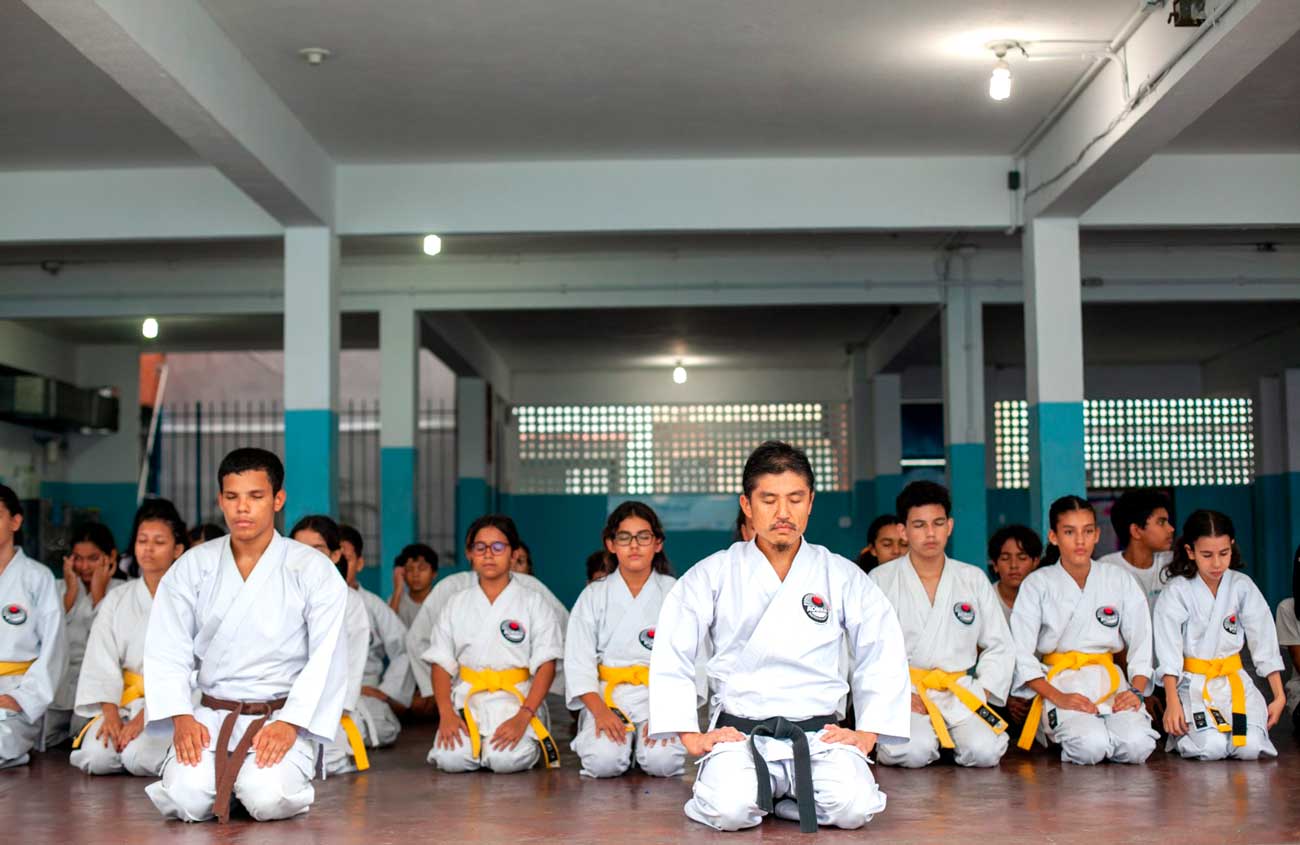
Students from the Municipal School João Saldanha in seiza for the end of class. The brown belt is Rayr Dias, the first instructor of the VemSer project who started practicing karate at the E.M. São Thomas de Aquino school © ftdiniz / Felipe Diniz
The Adopt a Champion and Help Form a Citizen project, developed in the municipalities of Marau, Vila Maria, Camargo, Gentil, and Nova Alvorada, serves 500 children and teenagers. Since its foundation in 1999, more than 6,000 young people have participated in the project.
Juarez da Silva, a 5th dan ITKF black belt, graduated in pedagogy and physical education (CREF 035666-G/RS), is responsible for the project, which also includes professors Douglas Albano (3rd dan ITKF), Eduardo Debovi (3rd dan ITKF), Frank Manera (2nd dan ITKF), and Samanta Martello (1st dan ITKF). The team includes professionals from psychology and social assistance, among other areas.
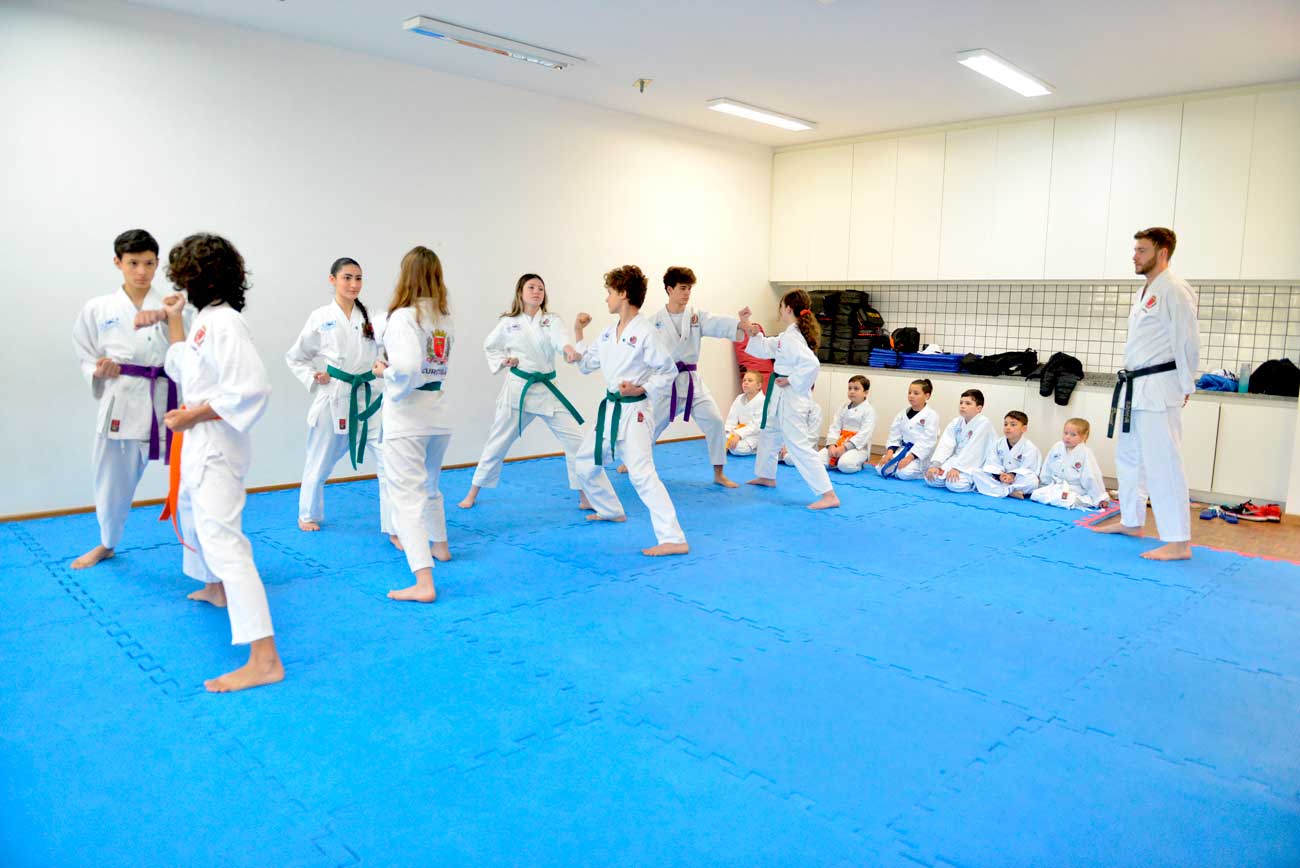
Sensei Daniel Carollo accompanies the training of more advanced students © Global Sports
“The karate social project has had many effects on our society, related to the performance and behavior profile in school, family, and social environments of the beneficiaries,” says sensei Juarez. “Traditional karate-do, thanks to its teaching methodology, preserves the essence and tradition of true martial art for training and education, meeting many children’s and teenagers’ needs, not to mention the therapeutic value offered to its practitioners.”
The Marau project was the first to receive ITKF recognition on June 13, 2022. “This certification certainly gave more visibility and credibility to our work regarding the socio-educational benefits provided and the guarantee of legality in applying public resources,” assures sensei Juarez.
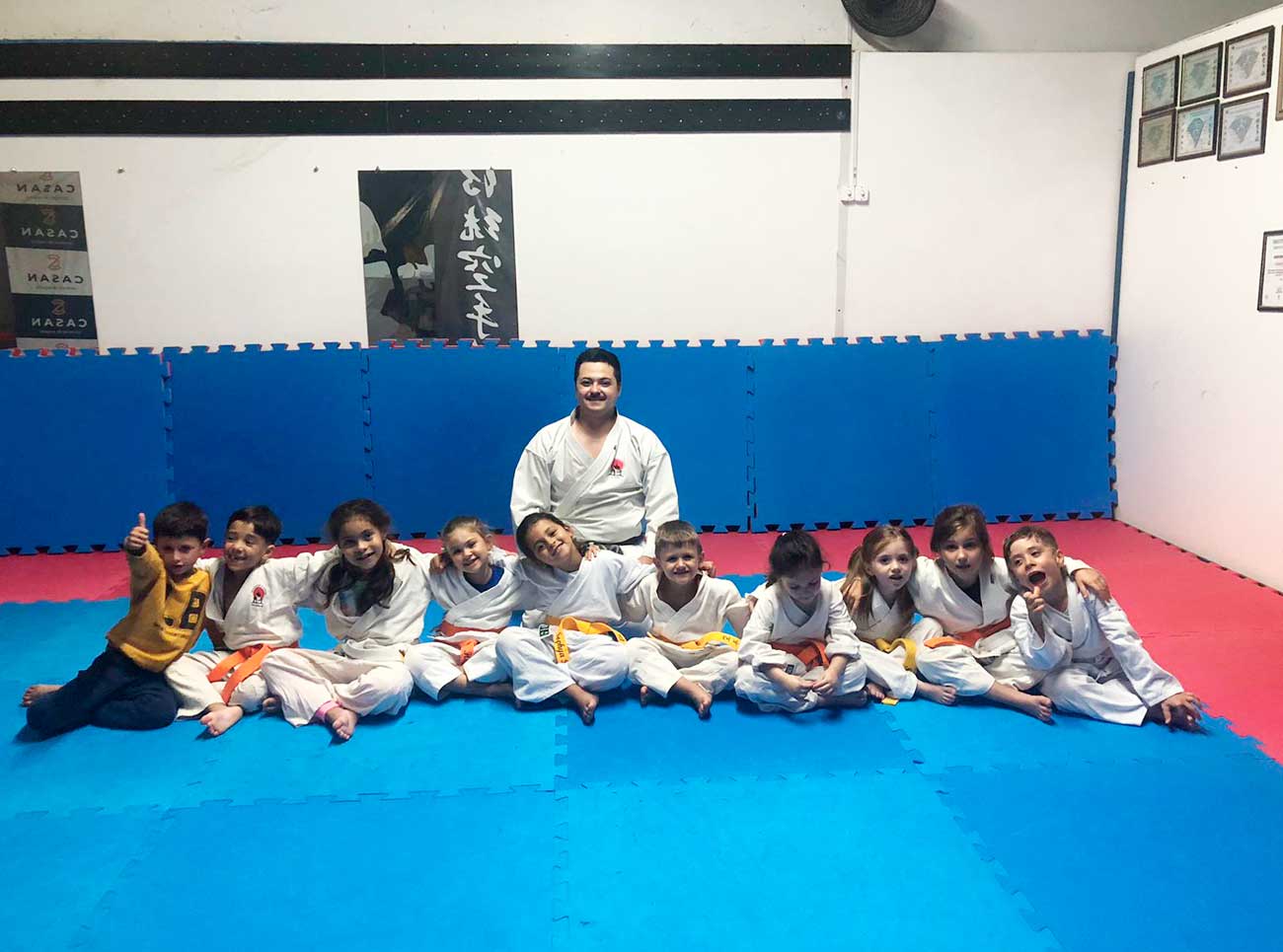
Students of sensei Douglas Albano from the Adopt a Champion project in Gentil © Archive
Traditional karate classes or socio-educational projects began in Guarapuava in 1992. Newly graduated in physical education, Guilherme Carollo became friends with the Municipal Secretary of Sports and suggested implementing karate socio-educationally in the city, but with a differential from other sports, bringing the philosophy and principles of the modality, such as self-development, to children who could not afford a gym.
The first agreement with the city hall served 500 children in three places and was relatively easy to implement because it did not necessarily require tatamis and kimonos. This school operated from 1992 to 1996, and based on this experience, sensei Guilherme took the idea to the state government. A pilot project was created in eight municipalities with the support of the Paraná Children’s Secretariat and the Paraná Karate Federation.
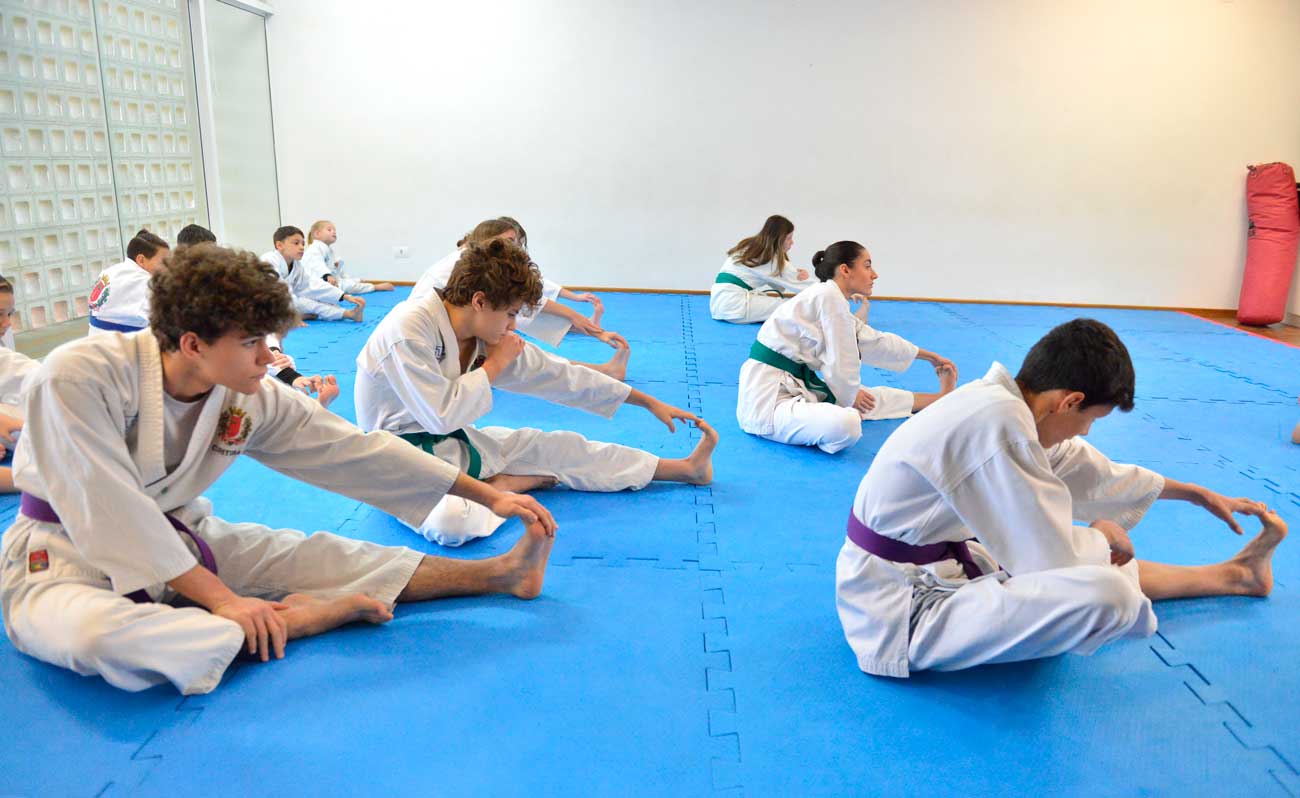
Students from the dojo at the Santa Felicidade Community Center stretch before training © Global Sports
From 1998, the project named Karate Piá in Sport expanded and reached 246 Paraná municipalities in 2005. “We served 35,000 children per month and believe that more than 200,000 children went through the project during this period,” recalls sensei Guilherme. After that, several municipalities ran their projects.
“Nowadays, we have socio-educational projects with this same inspiration in the states of Rio de Janeiro, Rio Grande do Sul, Bahia, Ceará, Mato Grosso, and others where federations affiliated with the Brazilian Traditional Karate Confederation (CBKT) are located.”
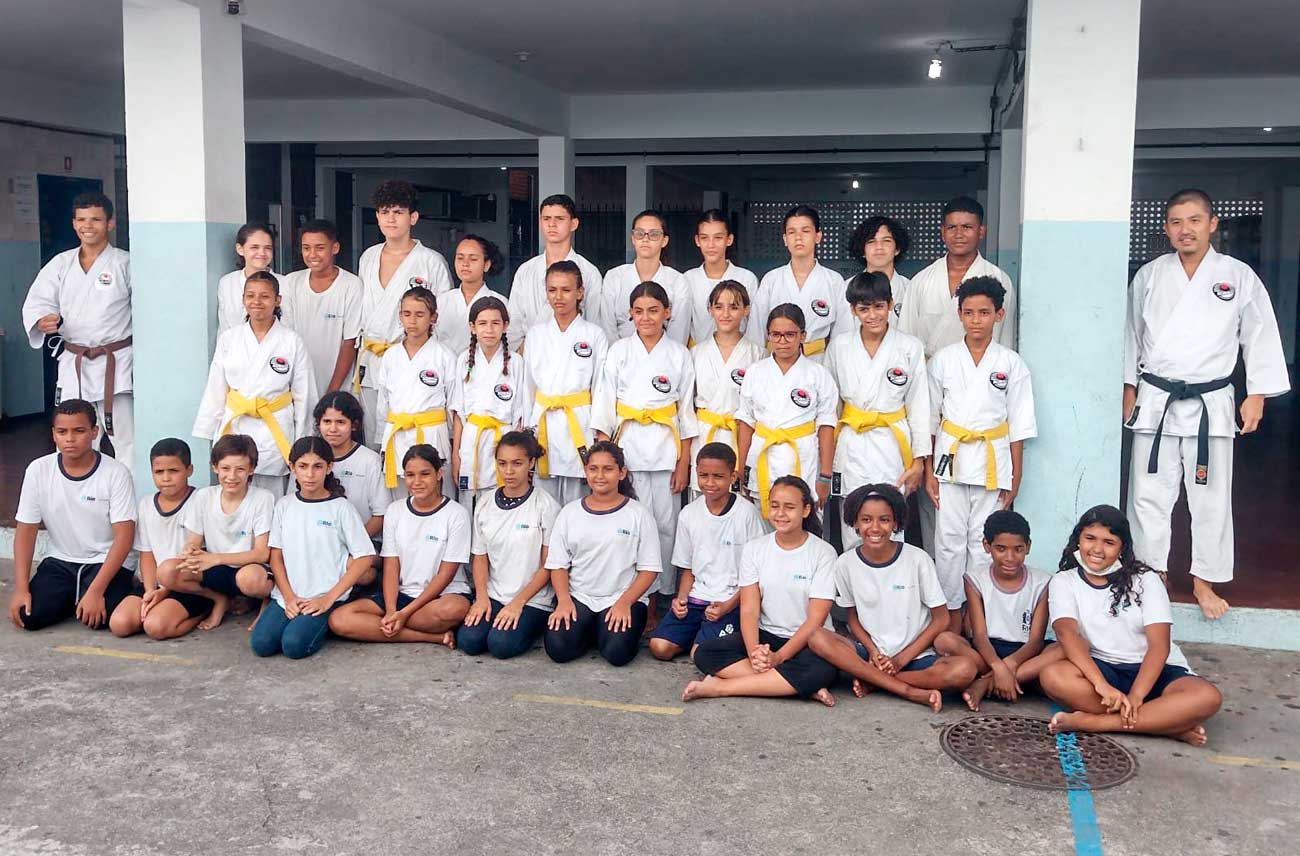
Students of the 2023 class from Municipal School João Saldanha © ftdiniz / Felipe Diniz
After the Karate Piá in Sport Project, others were based on this socio-educational action. One was the Karate São José dos Pinhais, which operated from 2005 until 2012, with 7,000 participants during that period. The Criança Quer Futuro (Child Wants Future) project, done with the Curitiba City Hall, prioritized children in socially vulnerable situations. With support from Criança Esperança, from Rede Globo, the Special Karate project focused on children and teenagers with special needs.
Sensei Guilherme estimates that in these 31 years, approximately 500,000 children have participated in some of these socio-educational projects. A significant differential in Paraná is the training of teachers. Many of them, as children, had participated in the projects. “Fortunately, it is still like this today,” concludes sensei Guilherme.
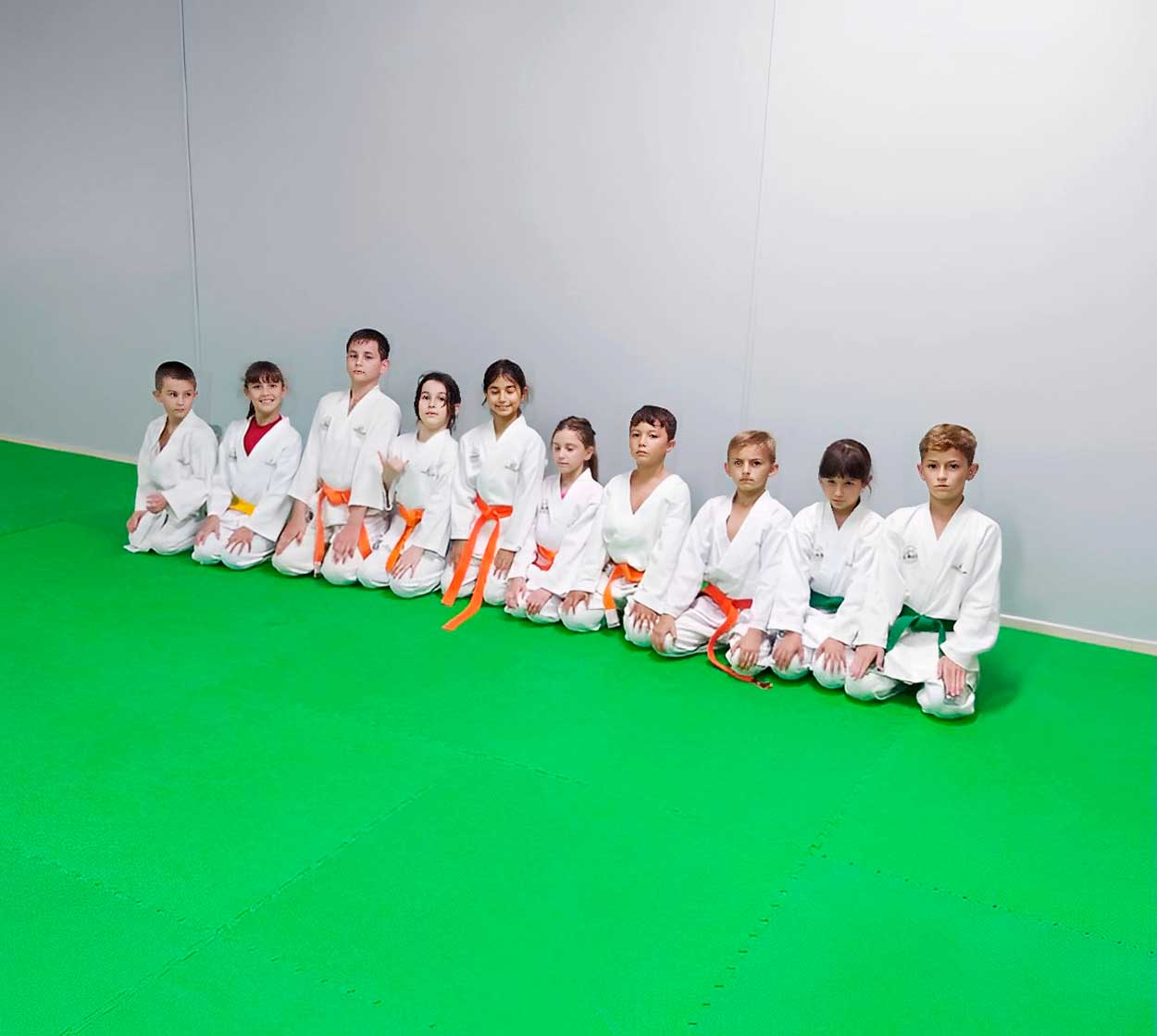
Some students of sensei Frank Manera from the Adopt a Champion project in Camargo © Archive
Professor Dr. Gilberto Gaertner, Chairman of ITKF, explained that the entity started certifying socio-educational projects in Brazil experimentally and will now expand this certification to other countries. For the leader, socio-educational projects are an important milestone in the applicability of the great transformative potential that traditional karate possesses.
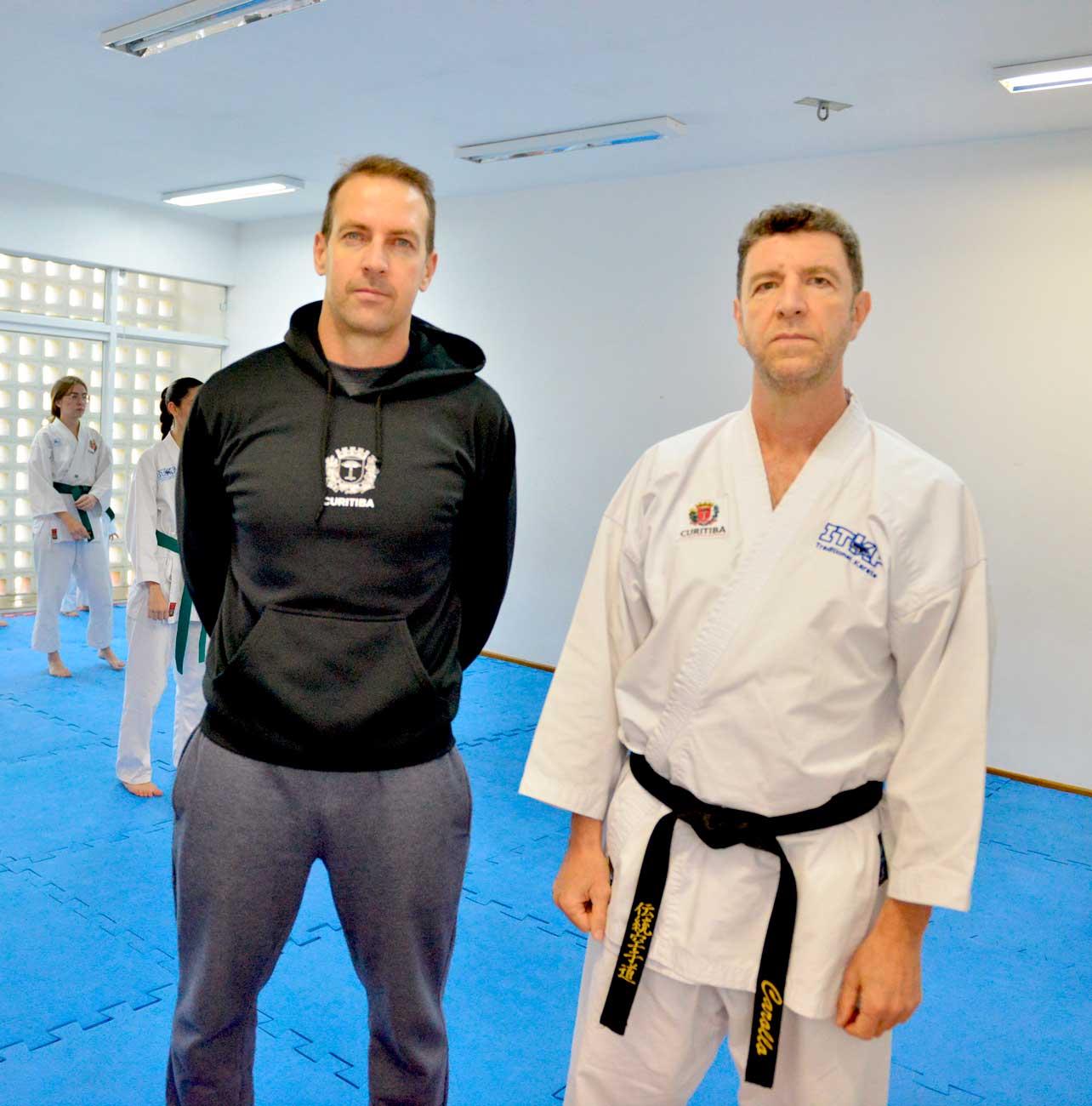
Sensei Guilherme Carollo with Lucas Paulo Torezin, coordinator of Clube da Gente Santa Felicidade © Global Sports
“Traditional karate has significantly impacted the physical, emotional, and cognitive aspects of its practitioners. This report highlighted some examples of excellent work, but we certainly have many other quality works being developed worldwide. To be certified, projects must meet and comply with the didactic-pedagogical standards and guidelines listed by the ITKF Socio-Educational Projects Commission. Responsible instructors also need to be duly registered with ITKF and hold a coach certificate.”
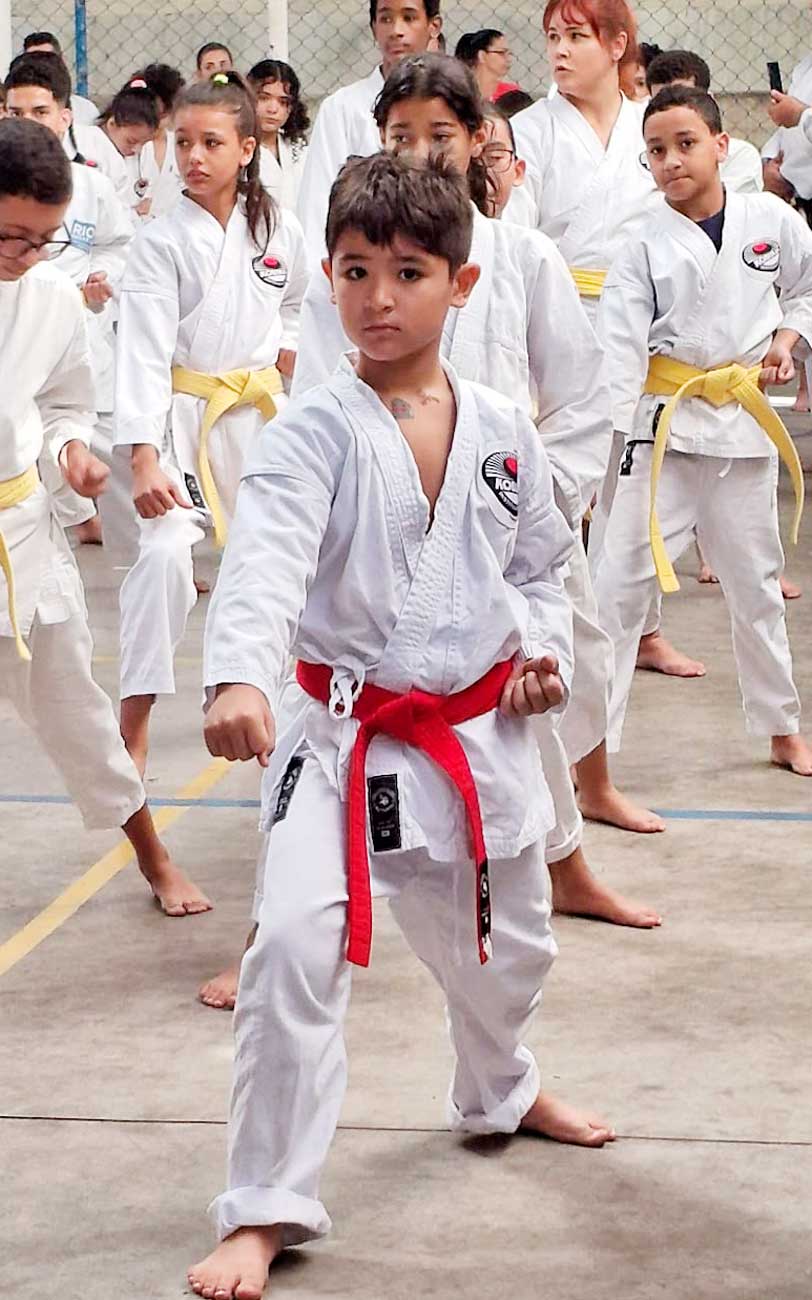
Kenzo Pereira Tanaka, grandson of Shihan Yasutaka Tanaka, is part of the class at Municipal School João Saldanha © ftdiniz / Felipe Diniz
“My dream is for us to systematically expand socio-educational projects globally to benefit as many vulnerable children and young people as possible and realize the social and educational function of ITKF Global traditional karate,” stated the leader.
Affiliates interested in accrediting their socio-educational projects can obtain information and make the request through the secretariat’s email: secretary@itkf.global.

06 de fevereiro de 2026
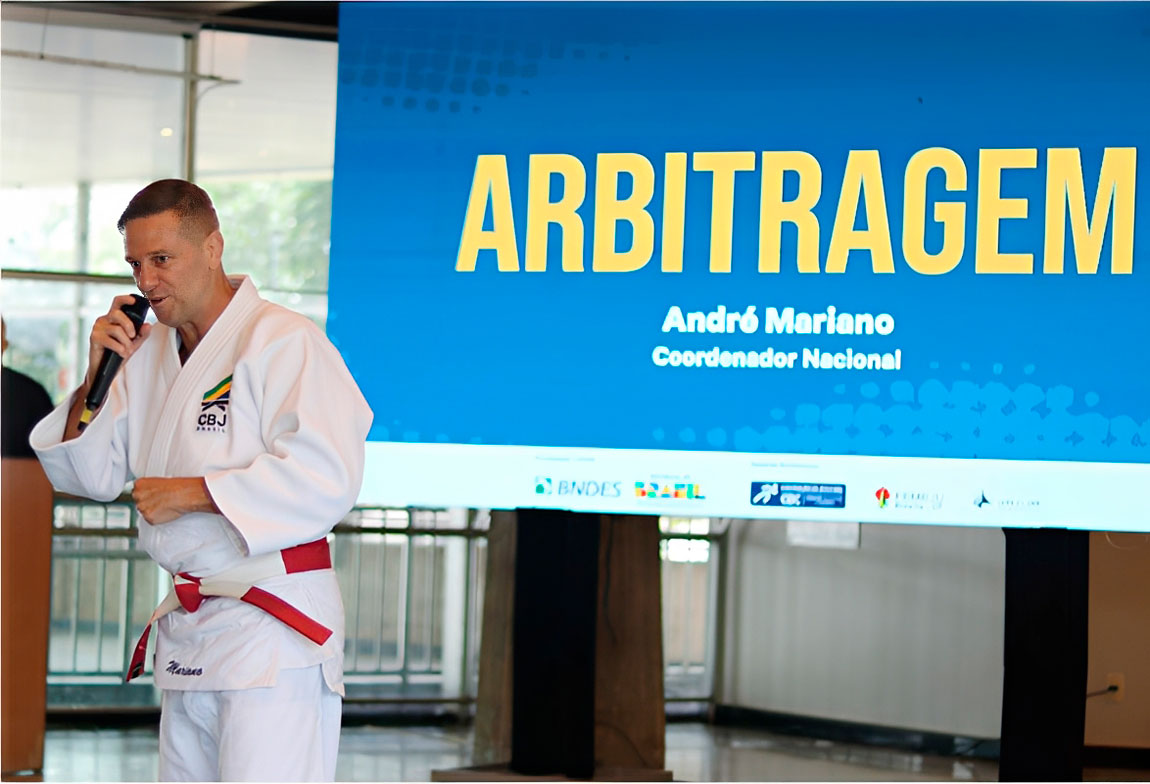
04 de fevereiro de 2026
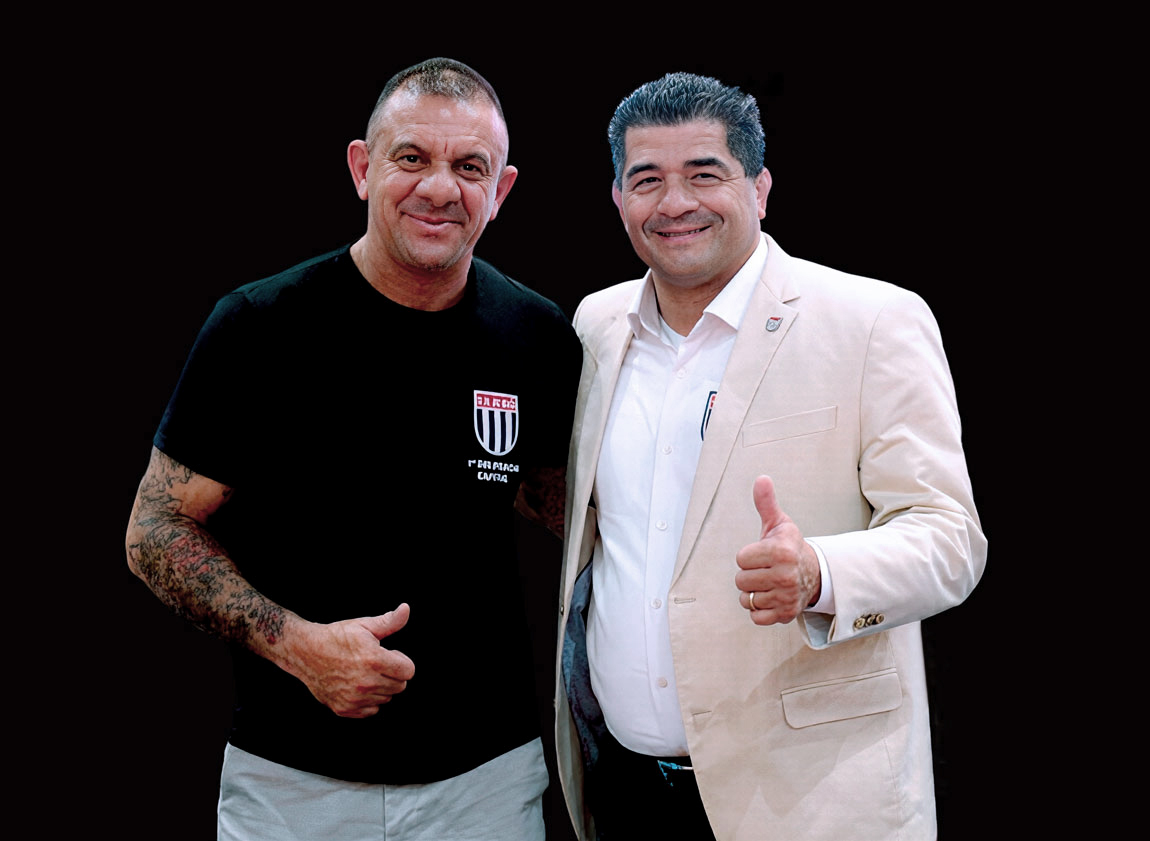
02 de fevereiro de 2026